This is a complete, updated guide to how to form and execute a lead-generation strategy for real estate growth in 2024 and beyond.
In our guide, you’ll learn — step by step — how to think about marketing, lead-generation tactics and opportunities, and guiding leads through your sales funnel to turn them into clients, including:
- Why you should focus on lead generation in the first place
- What a sales funnel is and how it relates to lead generation
- The difference between inbound and outbound marketing, and how to decide where to focus first
- How to find leads online and offline, using traditional lead-generation tactics in addition to brand-new, cutting-edge options
- Why you need to qualify your leads and exactly how to do it for maximum efficiency and minimum churn
- What lead nurturing is and how to think about it in relation to your funnel and your database
- How to evaluate and improve upon your lead-generation strategies until you’ve turned them into a well-oiled machine … and much more
Who is this for?
You are:
- A real estate agent, office manager, managing broker, admin, tech lead, or anyone else who wants or needs to build a new lead-generation system from the ground up.
- Knowledgeable about the process of buying and selling real estate. You’ve worked in real estate, in a brokerage, with other agents, brokers, admins, and assistants, and you are seeking to understand how lead generation works and how to improve your strategies.
- Interested in how you can use improved lead generation tactics to effectively generate new clients and take your real estate business to the next level of efficiency and effectiveness. You are eager to learn more, while recognizing that there are no silver bullets.
You want:
- To understand enough about lead generation to know what’s working, what’s not, and where to wisely spend your money.
- To create a steady stream of buyer and/or seller leads in your area and your niche.
- A focused strategy for generating leads using a web of proven, powerful tactics.
- To create a system for generating leads that relies less on paying for advertising and more on diverse and unique techniques.
- To be super-effective supporting other agents and brokers with real estate lead generation needs.
- To develop several channels for bringing leads into your business so that you never have to rely on just one source for your leads.
- A long-term strategy that you can focus on and execute instead of running in circles chasing the next big thing (that really isn’t).
By the end of reading this guide, you will:
- Understand what lead generation is and why it is critical for real estate agents.
- Know exactly what increases your lead generation results, and what can backfire on you.
- Be able to prioritize the lead-generation projects that will provide the highest return for your investment.
- Know how to talk about lead generation to administrators, marketing assistants, and the rest of your lead-generation support team.
- Understand how to integrate your lead generation efforts within your marketing strategies.
- Be able to measure the results of your lead generation endeavors, iterate on what’s working best, and discard what isn’t.
Let’s start learning about lead generation for real estate.
What’s the big deal with lead generation?
Lead generation is the lifeblood of any real estate agent’s business. Agents who have a solid lead generation strategy in place can adjust and iterate on it to create a steady flow of clients — and agents without a solid lead generation strategy can expect to constantly scramble for their next deal.
A lead is just another word for a buyer or seller you’re going to help with one major transaction: a home sale. You want those buyers and sellers to know who you are, what you do, and what you can offer them so that they decide to hire you as their agent. When that buyer or seller becomes aware of you, you can now consider them leads.
How do agents find — or generate — leads? First: Marketing and lead generation go hand-in-hand. To generate the best leads, you’ll need to lay the groundwork by understanding what value and benefits you have to offer your clients, and promoting those in the most efficient and effective way. You’ll need to discover what niche you serve best, brand yourself accordingly, and then let the world know what you can do.
There are just about as many lead-generation strategies as there are real estate brokerages. In the past, agents would knock on doors in certain neighborhoods and introduce themselves to the homeowners. You could buy lists of expired listings and for-sale-by-owner (FSBO) listings and start cold-calling those sellers. Mail and print advertisements are other forms of lead generation that agents have used in the past.
Today, agents have many more options when it comes to generating leads. The internet has opened up a new landscape of possibilities, and agents are generating leads using search engine optimization (SEO) and search engine marketing (SEM), social media, blogs, videos, and other online channels to attract, engage, and nurture leads.
Whether you’re a brand-new or seasoned agent, this guide to real estate lead generation will explain how it works and why it’s critical, share dozens of different tactics for generating leads, drill down into lead qualification and nurturing, and describe how to build a powerful lead generation system using multiple strategies.

How to think about lead generation in real estate
In the marketing world, a lead is someone who is interested in doing business with you. For a real estate agent, a lead could be either someone who’s interested in buying a house (but doesn’t yet have an agent lined up) or someone who’s interested in selling a home (but doesn’t yet have an agent to list the property). Or, it could also be someone who wants to rent a home and needs your help.
For real estate agents, a lead must be:
- Interested in buying, selling, or renting a house
- Financially qualified to buy or rent
- Willing to share contact information with you (such as a phone number or email address) for follow-up
Buyer, seller, and renter leads alike will all progress through what marketers call the “customer journey.” This journey describes how the lead moves from awareness (learning about a product or service) through conversion (buying that product or service). From the marketer’s perspective, this journey looks like a funnel; there is attrition at every stage, so marketers know they’ll need to make a lot of people aware of their services to convert a few.

The three stages in the customer journey are:
- Awareness: The buyer or seller learns that you are a real estate agent who works in their area.
- Evaluation: The buyer or seller discovers more about you and compares what they learn to your competition (other agents).
- Conversion: The buyer or seller decides on the best (or one of the best) agents and makes a decision.
From the buyer or seller’s perspective, the customer journey looks more like this:
- Awareness: I have a problem, and I’m not sure who can help me solve it.
- Evaluation: I know these people could help me solve my problem, and I’m weighing my choices.
- Conversion: I am very close to making a final decision, but may have a few last questions.
As a real estate agent, your most effective lead generation strategies will capture more leads at the awareness and evaluation stages of their journey, because that’s when they’ll be weighing their choices and will be the most open to considering hiring you as their agent.
Be mindful that the awareness, evaluation, conversion customer journey applies to customers who know they have a problem to solve—buyers who know they want to buy a house, and sellers who know they want to sell. The buyer and seller leads who haven’t taken that step or made that decision aren’t represented in the funnel, but don’t forget about them! There’s an enormous opportunity to engage leads before they know they have a problem, or after they’ve solved that problem (for next time), by providing high-quality information and advice to them; we’ll share more about how that works later.

Do the leads come to you, or do you go to them? Inbound vs. outbound
So how do you get leads? Lead generation strategies can be broadly categorized in two big groups: inbound marketing strategies and outbound marketing strategies.
Inbound marketing involves attracting leads to you by creating resources and assets that you think those leads will covet. Think a downloadable checklist or ebook that you promote on social media, or using SEO or SEM to draw search engine traffic to your website. Remember, to count as a lead, the buyer or seller must be willing to provide accurate contact information to you so you can “capture” them.
You might also see inbound marketing called “permission-based marketing” — the idea is that you are asking your leads for permission to talk to them about their problem by enticing them to your website or social media page using the resources and assets you’ve created.
The inbound marketing customer journey looks something like this, and the prospect becomes a lead in the middle of the journey:

Outbound marketing traditionally involves advertising your services to strangers in the hopes that one of them might need you. One example is buying a billboard on the highway to promote your business.
There are some ways in which inbound marketing strategies and outbound marketing strategies can overlap (for example, email and social media can be effectively used for both types of strategies).
The other term you could see associated with outbound marketing is “interruption-based marketing” — the lead does not have a choice whether or not to pay attention to your message because you are sending it to them, not waiting for them to come to you. However, outbound marketing does not have to be obnoxious or disruptive to work effectively.
Outbound marketing will be most effective if you have some basic knowledge about your target audience. For direct mail or door-knocking, you’ll need to know where they live. For cold-calling, you’ll need to know that they were recently trying to sell a house (FSBO or expired listings).
Social media will allow you to target your audience even more specifically. You can conduct outbound marketing campaigns on complete strangers (a billboard on a highway with lots of traffic would be one offline example of this type of outbound marketing campaign).
The outbound marketing customer journey looks similar to inbound marketing, but you’ll be using tactics like direct mail, door-knocking, and cold-calling in lieu of blogs, keywords, and social publishing. Those early tactics will turn strangers into website and social media visitors, just like with inbound marketing, and when you have accurate contact information, you can add the lead to your customer relationship manager (CRM).
On that note: Using a CRM will be just as critical to your lead generation success as choosing the best tactics; if you can’t capture and follow up with the leads you’re generating, you might as well not even bother. Make sure you are coordinating all your leads into a single source and tracking their progress through your funnel and their individual customer journeys.
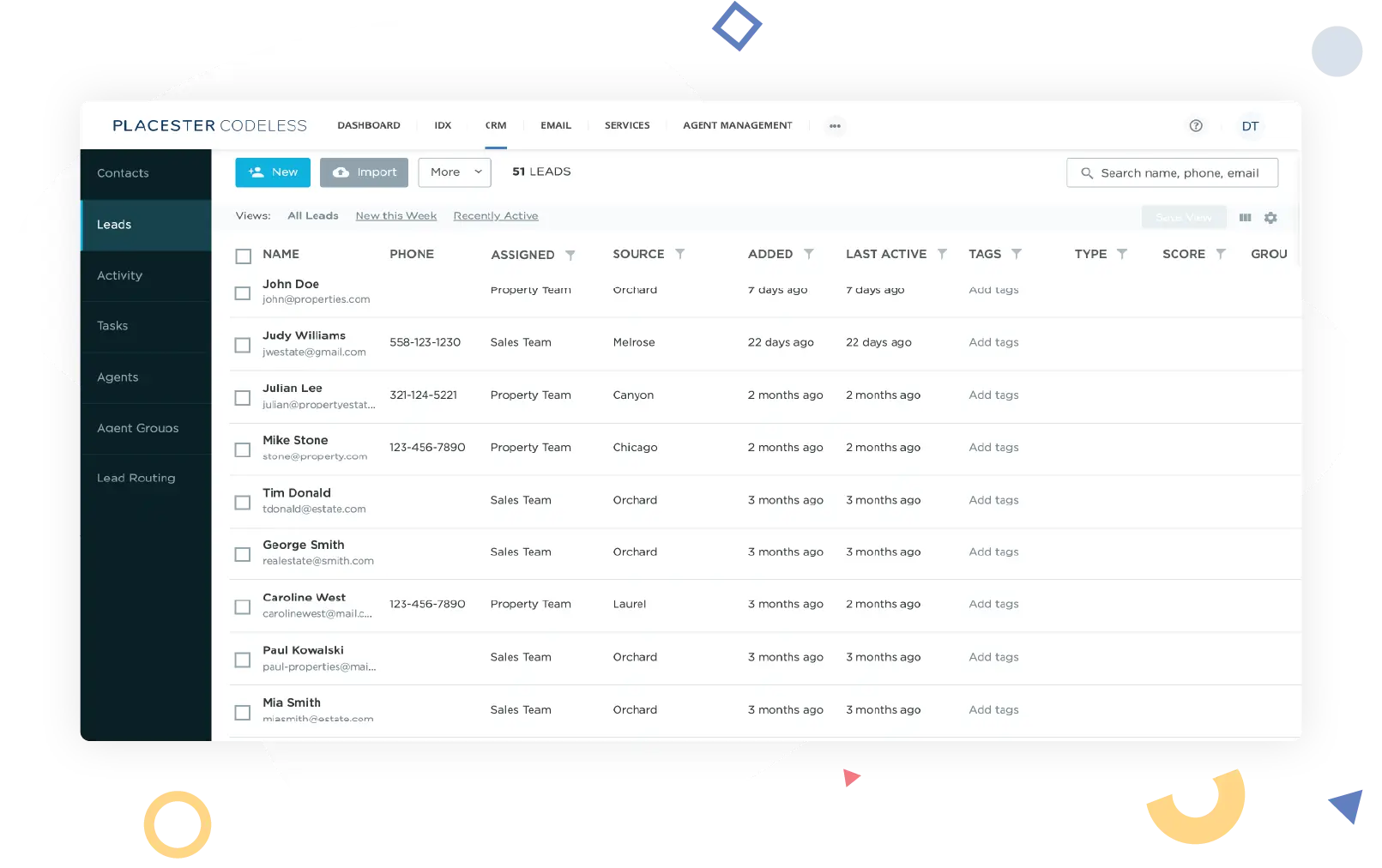
Which marketing strategy should you focus on as a real estate agent? Most of the best agents use multiple forms of lead generation — some inbound and some outbound tactics. It’s also smart to mix up your strategy in terms of digital and traditional or in-person lead generation efforts, whenever possible. We’ll provide several examples of each so you can customize a lead generation strategy that works best for you.
Traditional marketing tactics are tactics that real estate agents have been using for decades – well before the internet emerged. There are both inbound and outbound traditional marketing tactics; exploring these different ways to generate leads and market your services can help you pinpoint the mix that works best for you and your clients.
Some newer agents might want to start with digital marketing tactics before digging into traditional marketing tactics. It’s entirely up to you and where you feel comfortable, but remember: the more ways you learn to generate leads, the more robust and strong your business will become.
Outbound traditional lead generation tactics
FSBOs
With a for-sale-by-owner (FSBO) lead, you know that the seller is interested in selling because they have listed their house for sale without the assistance of an agent. The challenge is to convince this seller that they’ll have an easier time (and make more money) if they use an agent. And another challenge is that many agents target FSBO listings to try to convert them.
However, if a homeowner has had their home listed for months with little to no action, they will likely be more interested in hearing how you can help them. An FSBO lead is a warm lead in the sense that they are ready to sell a house soon or immediately – so targeting them can be a lucrative and smart lead-generation strategy for agents.
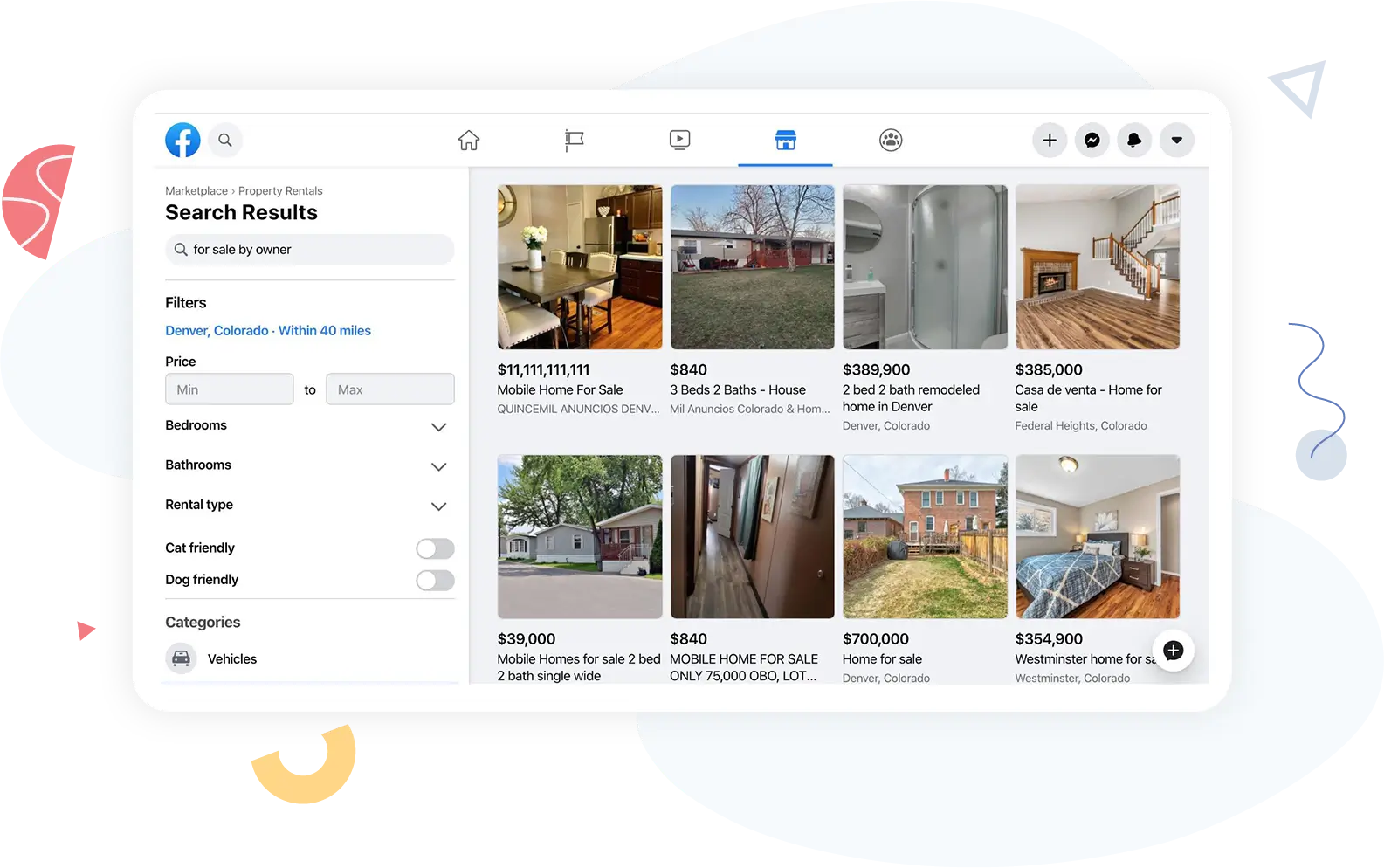
To find FSBO leads, check your MLS, look in your local publications for real estate listings (there might be a FSBO section), on Craigslist, social media (especially Facebook), and real estate portals (especially any sections that encourage sellers to list a price for which they’d be willing to move). There are also companies that specialize in providing FSBO leads to agents.
According to the latest statistics available from the National Association of Realtors, FSBO homes sell for (on average) $60,000 less than agent-assisted homes. You’ll want data like this at your fingertips when you start a conversation with an FSBO lead.
Expired listings
An expired listing is a house that was for sale recently, but for whatever reason, it’s been pulled off the market. Maybe the seller didn’t get an offer they liked; maybe the house wasn’t marketed as well as it could have been; maybe the buyer financing fell through and the seller was too daunted to keep going.
You can get lists of expired listings yourself from your MLS. Figure out which areas you want to target and start looking for listings in those areas that are about to expire. Make some calls and ask if the sellers are interested in switching agents. It sounds simple, but to be really successful, agents will have to make sure they are keeping tabs on leads in their CRM and following up after the listing expiration date. Depending on how many leads you’re juggling – and how many deals you have in the works —this can quickly get overwhelming.
There are also companies that curate and send you lists of expired listings, which might be something to consider if you have luck with them but don’t have time for detailed lead documentation and follow-up.
Circle prospecting
When you get your first listing, circle prospecting is a low-cost but effective way to generate interest in the house for sale and more leads for your own business. Circle prospecting involves sending notices or fliers to the homes within a block or two of your listing, letting homeowners know that the house is for sale and inviting them to learn more on your website or at the open house.

You should always include a way for the recipient to ask you more questions, obligation-free, so include a sentence or two about a free comparative market analysis for homeowners who are interested in learning about how their own property measures up against your listing.
Target absentee owners
Ever driven past a home that’s been empty for as long as you can recall and wondered “who owns that place and will they ever do anything with it?” As a real estate agent, you have an opportunity to discover more and possibly inspire them to make a decision about an asset that’s been literally collecting dust.
The best (and least creepy) way to do this is to note the address of the house in question and send a letter there, requesting forwarding to the homeowner. You can also check public records to try to find out the homeowner’s name and address, which might be necessary if the owner lives out-of-town or out-of-state. Introduce yourself, note your experience in selling homes like this one, and offer to answer any questions.
Think seasonally
Holidays and seasons are huge for agents who like to leverage outbound marketing tactics; there are all kinds of things you can offer to give away that people will want at different times of the year. This can, and should, go well beyond sending a card with a reminder that you’re still in business. Some agents bake (or buy) pies for Thanksgiving, others might create a custom Christmas ornament to offer, while others might customize chocolate foils for Valentine’s Day and hand them out.

If you like holidays, then coming up with some custom swag or ways to celebrate might be a fun activity to pair with an inbound marketing tactic, such as inviting friends and neighbors to a holiday event that you host. Pumpkins at a fall festival, flags on Fourth of July, eggs at an Easter hunt — those are some of the most obvious options, but your creativity is the only limitation!
Print ads
This once-quite-popular lead generation tactic has fallen out of favor among real estate agents, but even though local newspapers aren’t as thick as they used to be, they’re usually supplemented in larger cities by specialty publications like business journals and alternative weeklies. If a local newspaper targets the same group of leads that have worked well for you, then why not place an ad in the real estate section and see what happens?
Public records
Be careful with this one, as you don’t want to get a reputation as an “ambulance-chaser” or an unethical agent. Public records document big life events such as marriage, divorce, and death, and oftentimes, people need to upgrade or downsize their housing situation as a result.
That said, please do not use public records to look up people in your area who have suffered a death in the family or are going through a divorce, so you can cold-call them and ask if they are interested in selling their house. Ideally, you should use public records to see whether someone you know is experiencing a life event that has somehow escaped your notice, so you know when to offer your services tactfully.
Mark milestones for clients
Do you remember the first home sale you helped usher across the closing table? Your buyers definitely remember signing all those documents and then palming the keys to their new, biggest asset. Agents who help commemorate those milestones by sending cards, gifts, or just reaching out to say “hey, happy homeowner-birthday to you!” prove that they care about the long-term happiness of their buyers, not just the short-term commission check.

Meet in person
Some agents meticulously run through their CRM monthly or quarterly, making a point to schedule in-person meetings with a certain number of leads or former clients. There’s a lot you can discern in person that you can’t over the phone and certainly not over text message or email, and catching up over coffee gives you a good reason to share how you’ve been doing and ask how your lead is getting along.
Maybe you’ll hear that they’re thinking about selling, or maybe you’ll learn how happily settled they are in their current home … but that they have a friend who’s not in the same situation.
Old-fashioned phone calls
Although in-person meetings definitely tell you more, calling your leads on the phone periodically to check in on them is a good way to make sure you know what’s going on in their lives. As a result, you can keep tabs on their interest in or timeline for buying or selling.

The calls should feel like you’re catching up with friends or family, not like a chore. If you find yourself “cutting to the chase” and asking questions about whether your lead knows anyone looking to buy or sell, without allowing the conversation to travel naturally there (or not), then take a break from this one and come back when you’re interested in having a longer conversation.
Handwritten notes
Sending your leads a handwritten note is a thoughtful and personal way to let them know you’re thinking about them. Unlike a phone call or in-person meeting, your lead can respond (or not) to your handwritten note at their convenience. Many agents swear by sending a certain number of handwritten notes every day or week to their leads and people in their spheres of influence.
This can be an especially effective tactic when you pair it with a phone call or invitation to meet in person: Set the stage for the more in-depth conversation with a quick handwritten note asking your lead to catch up. Then call them a week after you mail the note to check in or see if they’re free to grab coffee.
Inbound traditional lead generation tactics
Referrals
Referrals are one of the most powerful and reliable sources for new leads. According to the National Association of Realtors Profile of Home Buyers and Sellers, 41% of buyers used an agent referred to them by a friend, neighbor, or relative, and 12% worked with an agent they’d worked with in the past. The survey noted that 66% of sellers worked with an agent referred to them or with whom they’d worked in the past to buy or sell a home.

You can generate referrals by keeping into close contact with your past clients using some of the ideas above. If you have a handful of clients who tend to send you business, reward them with gift cards, a meal out at their favorite restaurant (your treat), or another perk so they know you appreciate them.
If you’re just starting out in real estate, it can be tough to get referrals, but talking to your friends and family members to build your contacts — and providing great service— will give you an opportunity to test this strategy soon enough.
Agent networking
To get referrals, you’ll need a strong agent network. This should include not just the agents in your own brokerage, but ideally, agents all over the country who might know buyers moving into your area. This can be done through activity in your Realtor association, attending conferences, and building relationships with the people you meet.
You can also network on social media. There are tons of agent groups on Facebook, some specifically focused on referrals and networking, and others that are more about education and improving the industry. Lurking in a couple of different groups before you dive in can tell you more about whether it will be a good way for you to meet other agents.
Open houses
When you have a listing to promote, running an open house is a good way to show it off to lots of prospective buyers at once. And as a real estate agent, it’s an excellent way for you to find buyer leads who might not be working with an agent just yet, even if the house in question isn’t the best fit for them.
To make the most out of hosting an open house, you should make sure that you have a system for capturing and following up with possible buyer leads.
1. Market the open house
You aren’t going to have any luck finding buyer leads if you don’t let buyers know that you’re hosting an open house. Distribute marketing materials throughout the neighborhood and hang fliers to let everyone know about the open house. Promote it on social media. Add a banner, highlight, or flag to your own website listings so that browsers know there’s an open house happening. Don’t forget about the signage for the day of the event!
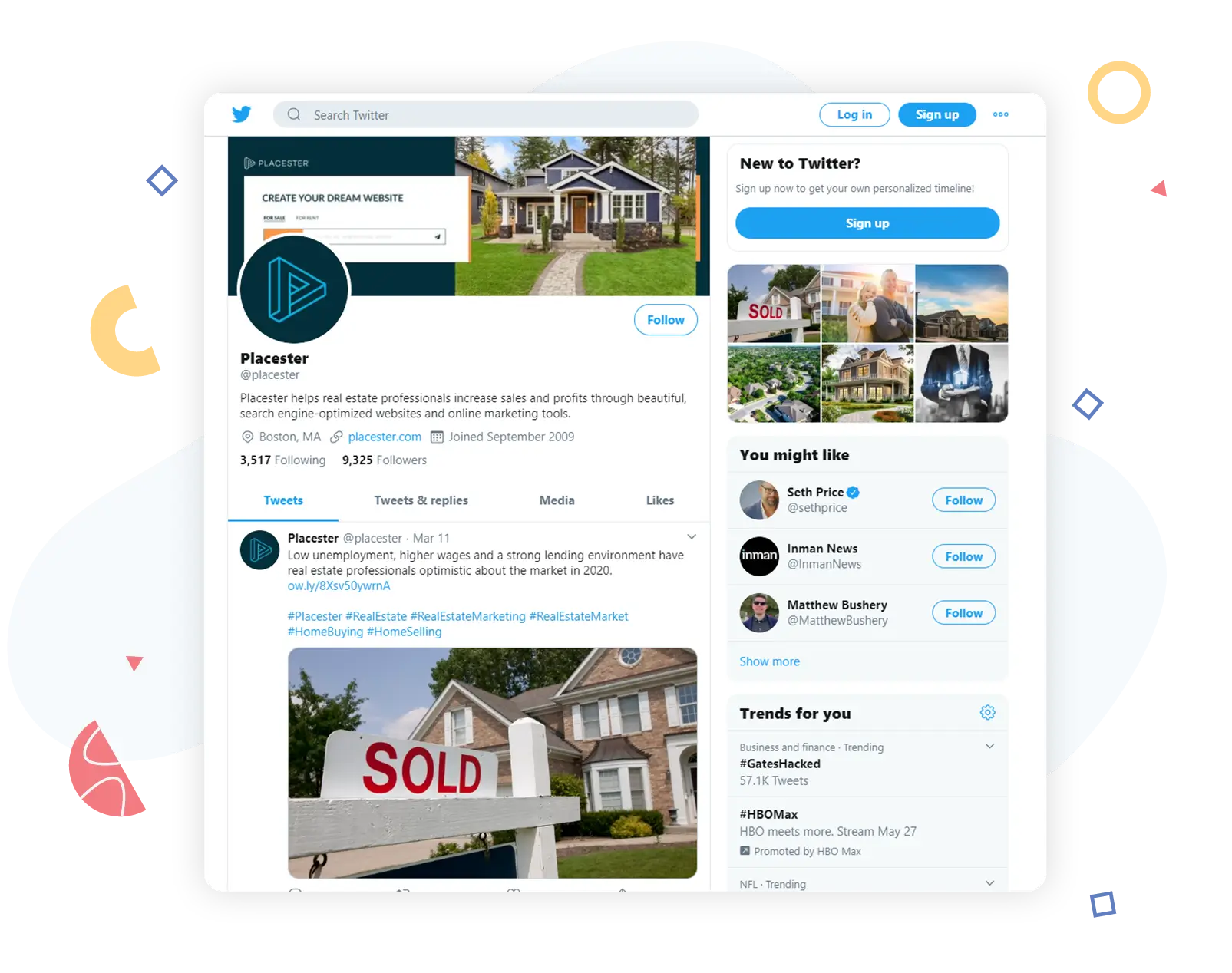
2. Get the details
Different agents have different levels of comfort with how to capture lead information at open houses. You might want to ask visitors to sign in using a sheet (with space for a phone number or email address), but be aware that you might not get the most accurate information if some buyers (or lookie-loos) don’t want to give you a way to contact them.
Another way to get contact information is to start conversations with people walking through the house and therefore figure out upfront whether you might be able to help them with their home search. Even if this listing isn’t the right one for them, you might have another lined up that is.
3. Follow up
The contact information you’ve collected isn’t going to do you any good at all if you don’t use it to check in on your leads and see how their search is going. Buyers who are touring open houses are typically at the awareness or engagement stages of their customer journey, so these are warm buyer leads that should be prioritized.
Local partnerships
Lots of businesses depend on a thriving local real estate industry, from the obvious like contractors to the less-obvious like restaurants. Inspectors, plumbers, doggie day care centers, and the like all benefit in part from what you do. Consider your own interests and your niche, then figure out if a local partnership might be a good way to generate leads for you.
One option is to join your local Chamber of Commerce to get to know the other business-owners in town. Perhaps there’s a family law attorney who can recommend your services (and vice versa) when needed, and after you’ve been using the local pizza establishment to feed your new homeowners for a few months, maybe you can ask the owner if you can hang a flier or put out some table signs.
Work with local investors
Investors are more active in some areas than others. If you’re in an area with a lot of investment potential, or where a lot of investors are working, you could help them by learning what their ‘buy box’ looks like and keeping tabs on homes that might be a good fit. Real estate agents are especially valuable to out-of-town investors who might miss homes that don’t fit perfectly inside their buy box but are nonetheless great deals with lots of potential for return on investment.
This can be useful when you’re working with sellers, too; not every seller has the capacity to fix up a house before they sell, and you should know local investors who are interested in buying a property as-is. When you get a reputation among investors for being a good agent to work with, you’ll get more investor clients.
Become a local expert
There’s a person in every area who’s the go-to resource for … everything. The best restaurant for a date night, the best third-grade teacher at the local elementary school, the best running trails, the best place to find organic pet food. What if you became that person for your neighborhood?

This tactic is best combined with other digital marketing tactics so that you can promote your local knowledge. Lots of agents have great success by blogging or posting videos on YouTube about their area, getting as granular and in-depth as they can. Most of the internet isn’t going to care, but the people who are interested in this kind of content are really interested.
Work with local news sources
Real estate is going to be a hot topic in the news for as long as people are buying and selling property. When a real estate market is swinging heavily in one direction or another — toward buyers or toward sellers — or when the market is about to shift, you can just about guarantee that a local journalist is going to be looking for on-the-ground commentary about what it all means.
Establishing connections and relationships with those reporters can earn you quotes in print and sound bytes or video clips in broadcast news outlets. Help them understand what’s happening in real estate in your area by taking time to educate them, and you’ll look like a go-to expert for local real estate issues.
Write a column for the paper
Real estate agents and brokers with a penchant for writing themselves might consider asking the local paper’s editor if they’d be interested in a regular column about the real estate market. If you focus on the numbers and what buyers and sellers really need to know right now, as opposed to selling your services in any way (hard or soft), then editors will be receptive to providing you a regular space to share your expertise. They need content and you need leads and exposure, so it’s a wonderful way to meet everyone’s needs while also helping the community.
Sponsor an event
What events — from festivals to theater to sports tournaments — bring your community together in a group? If there’s something you especially love to do, or an activity that’s particularly popular in your area, consider attaching your name to it by sponsoring an event under your business name.
Depending on the event, you might have an opportunity to give out swag, get a list of email addresses for attendees or ticket-holders, or get creative with your signage. Think about how you can promote yourself while keeping the focus on the event itself; the idea here is to start to win hearts and minds and establish yourself as someone who cares as much about the community as the most involved residents.
Become more involved in the community
Sponsoring an event is one option if you don’t have time to throw one of your own, but for a long-term lead generation tactic, consider starting up an event or group of your own, or becoming very active in one that’s already prominent in your town. Female or minority business-owner networking events, charity runs or races, fundraisers for environmental or community causes — you could spearhead any one of those if it aligned with your own values and goals.
Of course, you don’t have to start your own group or event to become a pillar in the community. Join the school board, or start volunteering at the domestic violence shelter. Find a cause or a group where you live that speaks to you and start getting involved there … and if you can’t find one, that might be a cue to start one.
Make sure everyone knows who you are
This is the concept behind those “free real estate advice” signs at the coffee shop, or the exhortations to always wear your nametag everywhere you go. If everyone knows what you do for a living and who you are, then when someone has a question about real estate, they’ll know exactly whom they can ask!
There are ways to do this beyond wearing it on your shirt or making a sign at the coffee shop; for example, make sure you note your occupation on your social media profiles, and that you have contact information and details about what you do in your email signature. Note it in your voicemail message on your cell phone. As the saying goes, “don’t be a secret agent.”
Host a workshop
First-time homebuyers don’t know what they don’t know about financing or what they can afford to buy, and after living in a house for decades, some homeowners who would be ready to downsize feel overwhelmed by the prospect. Those demographics would be audiences interested in workshops on, respectively, how to save up to buy a house, or how to get started with downsizing.
As an agent, you have the answers to their questions and can provide them with the education and inspiration they need to take a major step in their life. Local libraries will sometimes provide space for you to host a class if you make it free (which you should do anyway), or you can talk to your brokerage about using some office space for a class.
Print out handouts with useful resources and details, and make sure you include your own name and phone number on them. And bake in time after the class to answer any questions that attendees might have.
Become a deep resource
Becoming a local expert is one thing — that’s a broad resource, not a deep one. The difference is learning absolutely everything there is to know about one particular topic: military relocations, buyers with tricky and specific financial needs, the local schools, vacation rentals, and so on. If you don’t have a niche yet, think about the clients you’ve served so far and determine whether they have any commonalities. Are they all in a similar age group, working in a similar industry, or moving for similar reasons?
Remember, you sell real estate every day, while your clients probably don’t participate in a transaction more frequently than every few years. Take what you know and dig in a little deeper, and you could become the best resource for buyers and sellers in your area who have a specific need only you can meet.
Make moving easy
You know who likes to move? Basically nobody. After you’ve helped your sellers negotiate an offer, or your buyers seal the deal, you can make yourself a rockstar in their eyes by helping with the move in some small (or major) way.
Some agents send a meal on moving night, while others will send over a cleaning service. A handyperson a week or two after move-in to tackle any squeaks or drips can be a lovely way to show clients you care. Some handle transferring utilities, and others might even send help with the move itself via a moving service or truck. Think about what makes sense for your budget and business, but if you can ease this pain point, the word-of-mouth from happy clients will absolutely generate leads for you.
A new frontier: Digital lead-generation tactics that are perfect for real estate agents
Outbound digital lead generation tactics
Facebook Ads
Facebook has become one of the most powerful ways to reach consumers of all kinds, including in real estate. It’s the most-visited social media network, with 2.50 billion monthly active users and 1.66 billion daily active users; YouTube, the next-most-visited, has about 200 billion monthly active users.

With so many people visiting Facebook every day, there are undoubtedly buyer and seller leads in your market browsing the platform right now. And you know they’ll come back tomorrow, too.
The granular targeting options available in Facebook are what make this such a powerful tool for real estate agents. Make sure you know how you’re going to target by:
- Interests
- Behaviors
- ZIP code
- Age range
- Income
- Homeownership status
- Likeliness to move
- Behaviors (prior purchases and device use, for example)
- Connections (do they know someone you know, or have they liked or followed you?)
Facebook will also let you choose different objectives for your ad campaigns. One objective is to generate leads, but you can also run campaigns for brand awareness, engagement, reach, and conversions. If you install a Facebook pixel on your website, you can also retarget leads who have visited your website before.
The next decision you’ll have to make is the type of ad you want to run. There are several options on Facebook:
- Instant Experiences load quickly and are mobile-optimized; they combine a number of features of other ad options to provide a “complete attention” experience. You can use video, carousel photos, tagged products, tilt-to-pan, and more in Instant Experiences. The “Instant Customer Acquisition” and “Instant Storyteller” templates are especially useful for real estate agents.
- Video ads let you build a video using images and text, or upload and tweak a video for advertising purposes. Video ads can be placed in-stream (in videos people are already watching on Facebook as an ad), on Facebook Stories, or in the news feed.
- Carousel ads feature up to 10 scrollable individual images, each with an individual link. For real estate agents, they probably make the most sense when you have multiple listings in the same area to feature, or if you’re offering guides or resources to several different neighborhoods.
- Collection ads comprise one featured image or video with four smaller images arranged below the featured image in a sort of grid. They work well for retailers but can also be used to tell stories and convert leads.
- Slideshow ads are similar to video ads; there is movement, sound, and text available, but the file sizes for these ads are much smaller than videos, so they load faster and are still viewable on slower or less robust cellular networks.
- Photo ads are the easiest, simplest ads to make: a photo and your text is all you will need to put this ad together. But don’t discount these ads because they’re simple; Facebook itself has found that photo ads are among the most effective.
Determining the content of the ads you’ll run on Facebook is just as important as nailing the target audience and the type of ad. You don’t want to get a reputation as a spammy or tone-deaf agent, so consider using Facebook ads to promote things like:
- New neighborhood guides or website resources; if you’re working to become well-known in your community, one of the best ways to do it is to give people help for free. You can make that help available on your website as a blog post, landing page, or download, and then advertise its existence on Facebook.
- New or sold listings. People like looking at beautiful houses, so if you’ve recently listed or sold a home, post an ad about it on Facebook. What’s the point of advertising a sold home? Buyers who are ready to act now, or homeowners who are thinking about selling in the near future, will see the ad, and now you’re in their customer journey at the awareness or engagement stage.
Google Ads
If there’s a digital platform that’s more widely used than Facebook, it’s Google. The company doesn’t disclose search statistics or volume, but experts estimate that Google handles around 7 billion searches every day. To rank organically at the top of Google’s search results is not easy, but there’s a shortcut available: Google Ads.
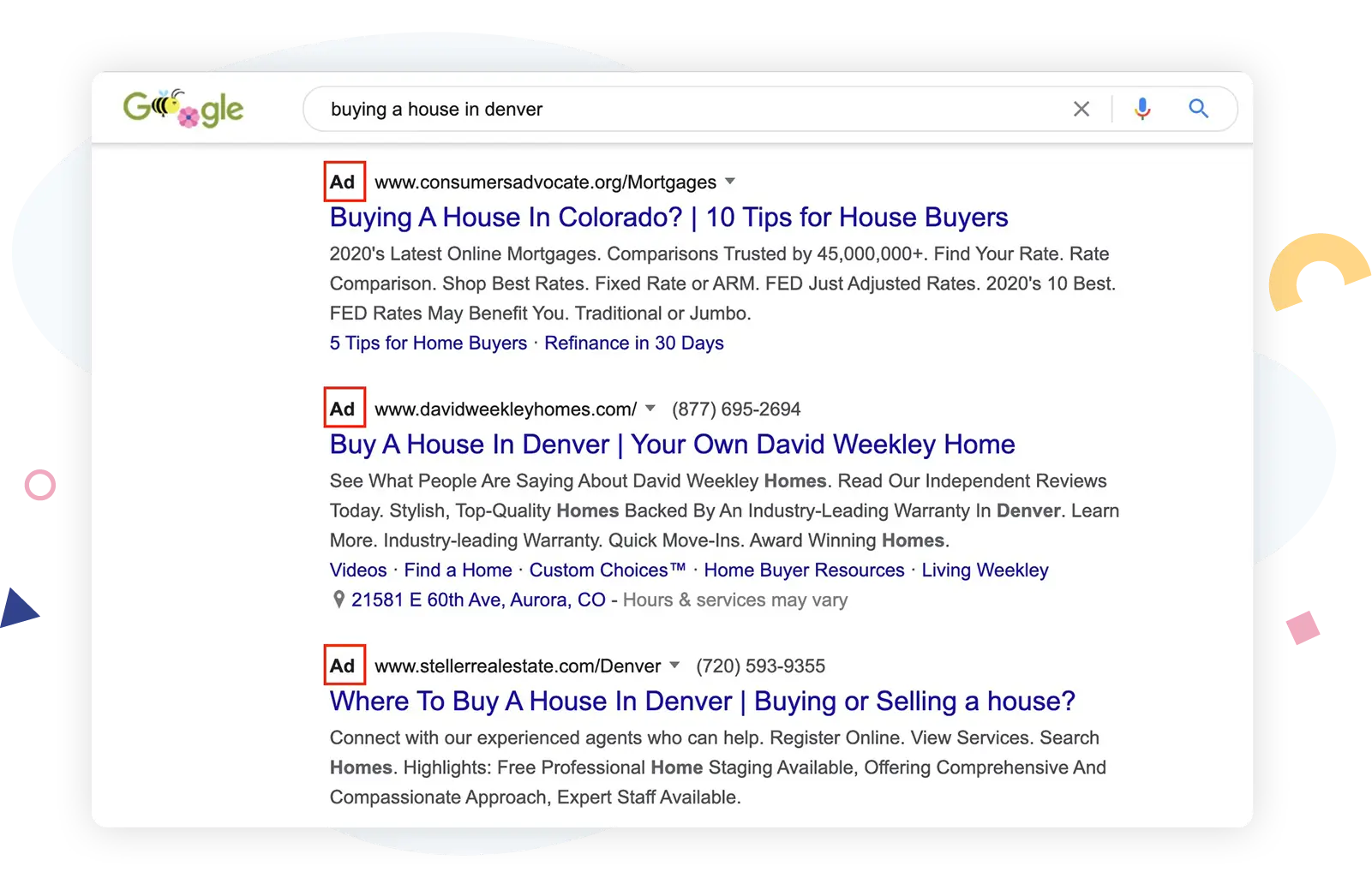
Google Ads will populate your business name and website at the top (or on the first page) of certain search results on the flagship search engine and Google Maps. While you’re working to turn your website into the best real estate resource available in your town, Google Ads can make sure you’re on the front page until your search engine optimization (SEO) catches up.
Other paid advertising
Facebook and Google are far from the only games in town; Facebook’s Instagram vertical is another place you can showcase gorgeous photos of homes for sale, and Nextdoor is capturing more interest from buyers and sellers as a viable and reliable place to find information about real estate. There are likely local opportunities that you could leverage, too — if you’re not interested in print advertising, it’s highly likely that the local newspaper will offer a digital ad package instead.
Retargeting website visitors
You can only use this strategy once you have your website set up and have run some campaigns to attract visitors — using a Facebook Pixel or another retargeting tool gives you the ability to run ads specifically for that group of people based on what they were initially interested in learning.
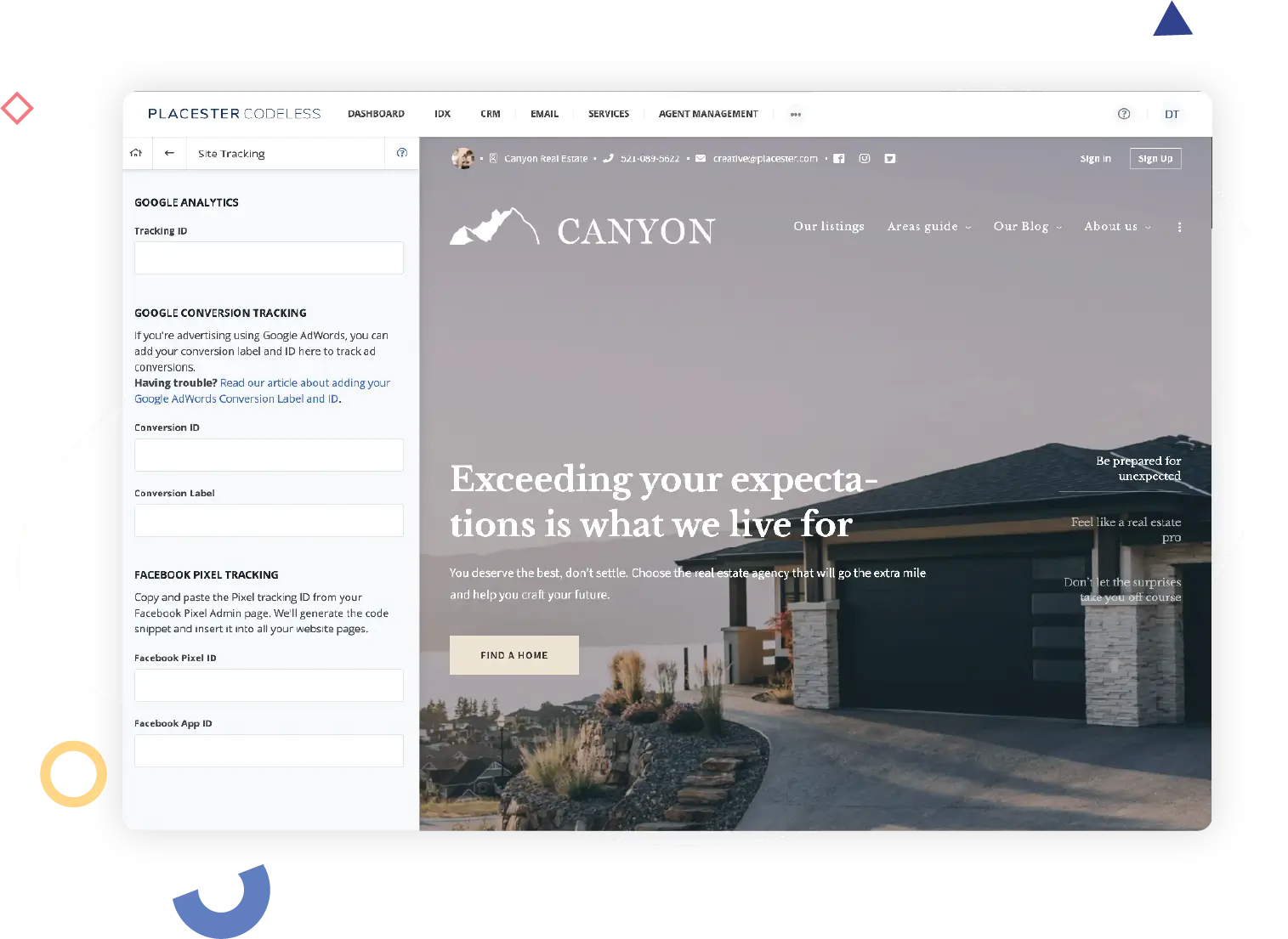
For example, maybe you have been running a campaign for first-time buyers, helping them figure out how much they need to save up for a house. A few days later, you could retarget any buyers who were interested in that campaign with a new campaign about down payment assistance programs. Or if you have a group of people interested in a specific listing, you can target them with a campaign inviting them to take a look at the floorplan in exchange for an email address.
When you retarget people who have already responded to one of your ads by clicking through to your website, then you have a better chance of increasing your high-quality leads.
Real estate portals
Love them or hate them, you can’t talk about lead generation in real estate without talking about portals. The fact is that Zillow, Trulia, and realtor.com all capture insane amounts of real estate-related web traffic — almost 80 million unique monthly visits per month between the three of them — and there are a lot of agents who rely on that traffic to generate leads.
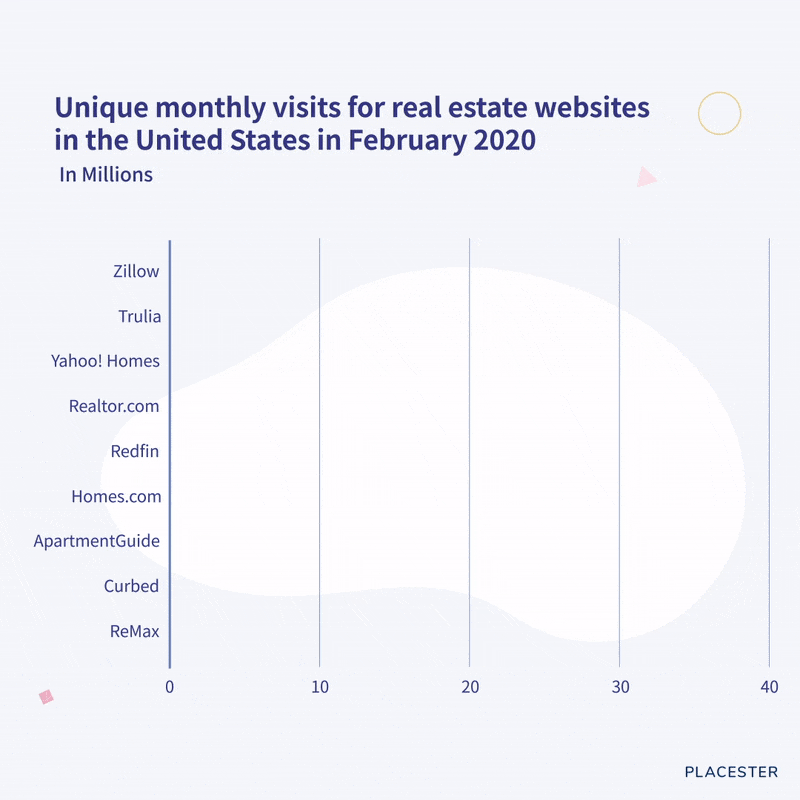
Portal leads become more expensive based on demand, so in the most popular ZIP codes, buying leads from the top portals might not be financially feasible for an agent who’s just starting out. The good news is that this is (and should be) just one of many lead-generation tactics that you can employ.
Inbound digital lead generation tactics
Local SEO
The National Association of Realtors also gathered data around the first steps that buyers take during the home search process:
- 44% look online for homes
- 17% talked to an agent
- 11% looked online for information
- 7% contacted a mortgage lender
- 6% talked to a friend
- 6% drove around looking at homes
More than half of the buyers who could become your leads (55%) start their home search online — which means that local SEO (search engine optimization) can be a very effective way to attract local buyers. Simply put, SEO is optimizing your website to show up higher in search results for terms that buyers and sellers are likely to search: “homes for sale (my town)” or “selling a house in (my town),” for example.
We have another full resource on SEO and other SEM (search engine marketing) tactics that you should definitely check out if this strategy interests you, but at bare minimum, you should create a Google My Business page for your business (https://www.google.com/business) and make sure you fill out your name, address, and profile— otherwise known as your NAP — consistently everywhere.
If you do this well, you can rank in Google’s map pack, the top three results shown when searchers are looking for a resource.
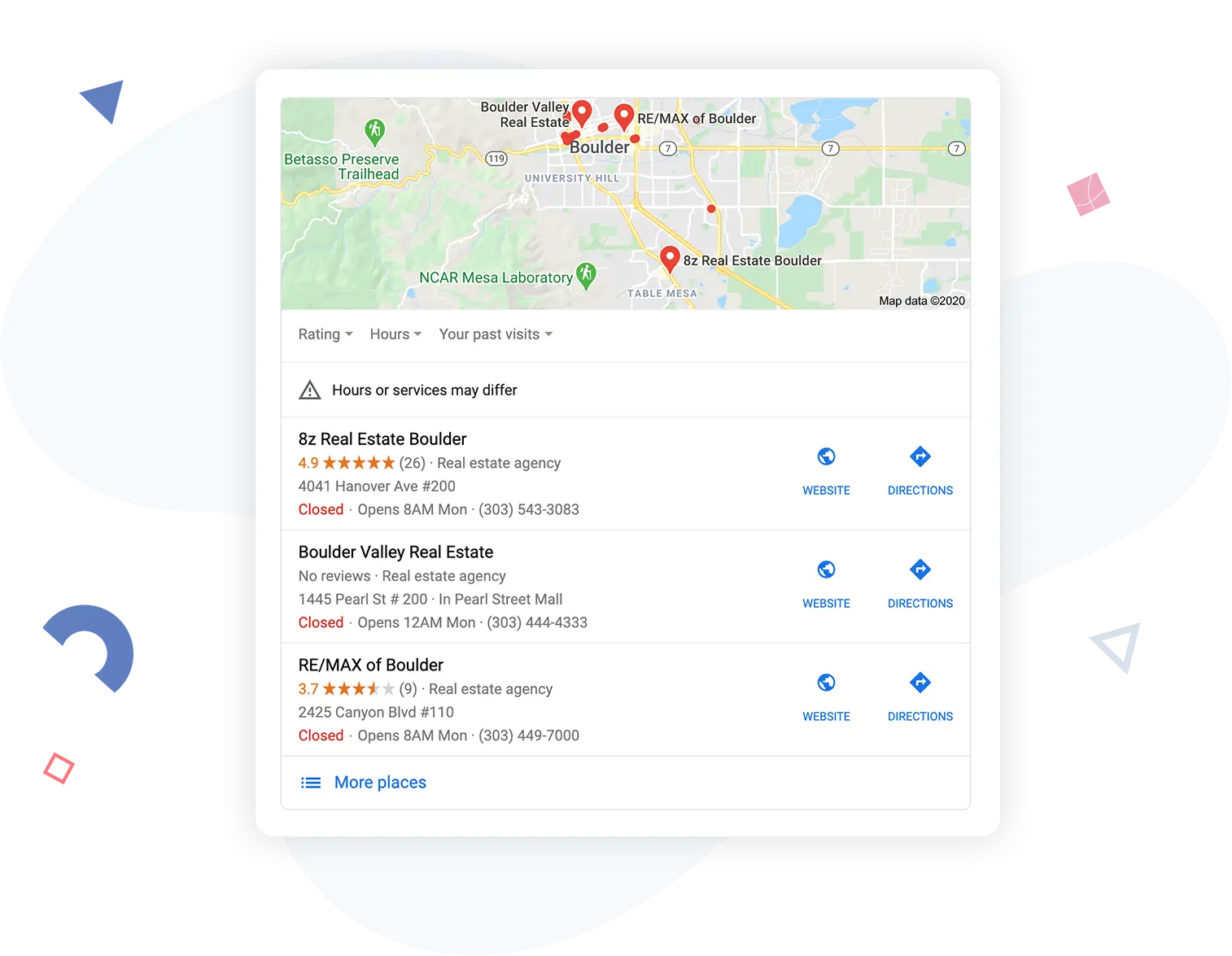
Ranking highly in the map pack will help you generate more foot traffic, phone calls, and website visits for your business.
Collect reviews and testimonials
In some ways, this is more of a passive tactic than an inbound one, but the idea is that if you can gather together reviews and testimonials from previous clients (especially ones who can testify about how you saved the sale), then use them across your website and digital profiles, you’ll leave a trail of breadcrumbs for curious buyers and sellers.
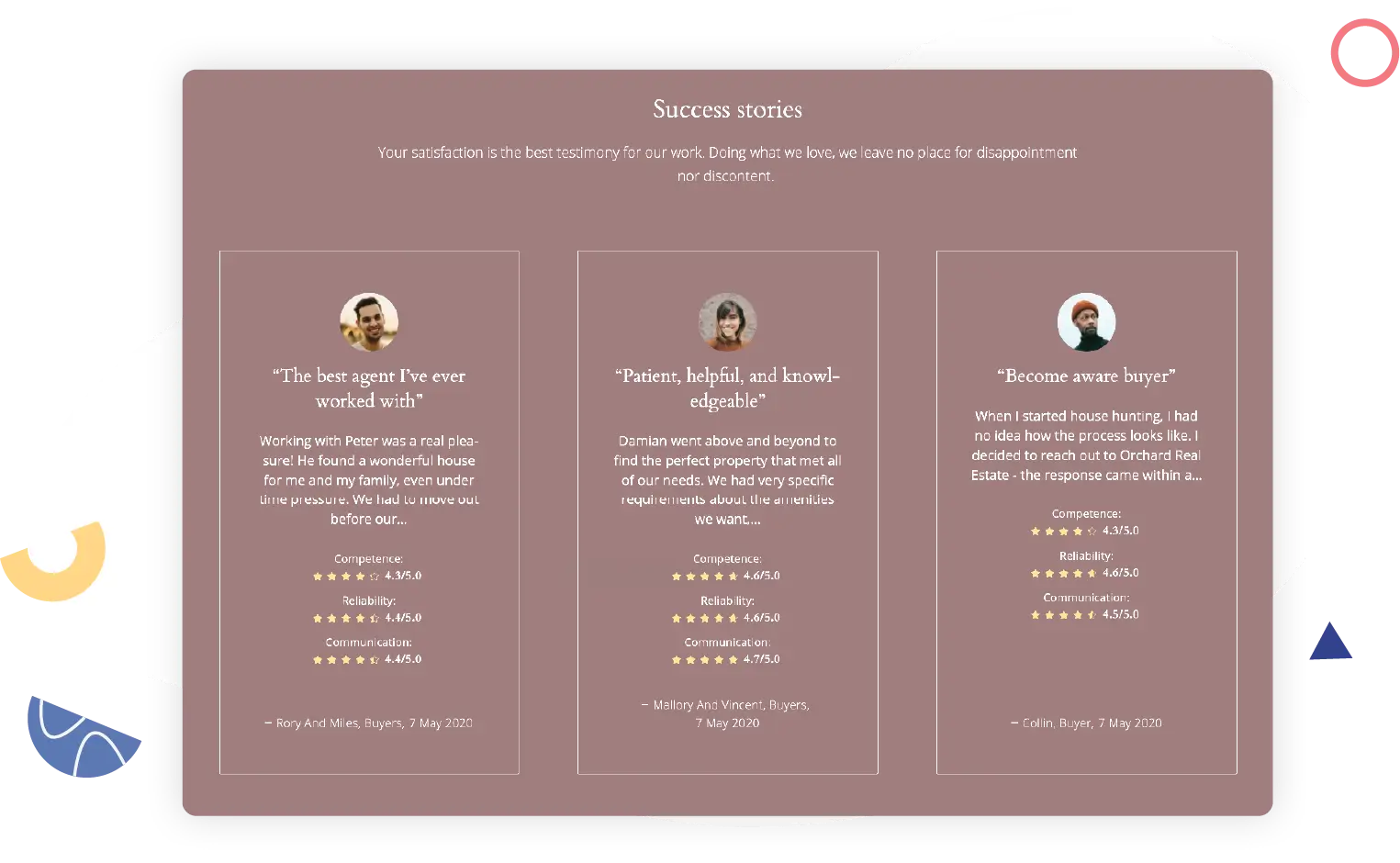
One review or testimonial by itself isn’t a lead-generation strategy, but if you gather enough of them together and make them visible, they send a powerful message.
Landing pages
A landing page is a space on your website where you are inviting visitors to “land” for a very specific purpose. On the landing page, you will make your audience some kind of offer — and the hope is that after an intelligent and thought-through campaign that ends with a landing page, when they get to the bottom of the page, they almost can’t help but to click the button and take the offer. (In exchange, you’ll get something of value: money, contact information, or another asset you’re seeking.)
You see landing pages frequently on sales-as-a-service (SaaS) or product websites. Typically, you’ll promote the landing page with social media or Google ads, and it will be the only place on your website where you are directing respondents.
Proponents of landing pages tend to follow the “more is better” philosophy; Hubspot found that businesses with 10 to 15 landing pages increase leads by 55% over companies with fewer than 10 landing pages. This could be because companies more experienced with making landing pages tend to make better landing pages! But it does show the power of a well-produced landing page in capturing business.

Although they are effective, many agents struggle with using landing pages well. The trick is to construct a page that makes the visitor feel like they are getting an amazing deal for whatever you are offering. Some landing page concepts that might lend themselves well to real estate in exchange for valid contact information could include:
- Offer a free, no-commitment educational consultation (and mean it) for first-time homebuyers.
- Offer a reliable home valuation (it should be better than what’s on the real estate portals).
- Offer community guides (more on that below), preferably as a downloadable PDF.
- Offer buyer guides, preferably as a downloadable PDF.
- Offer details about or access to luxury listings.
Our guide to landing pages shares some examples of quality landing pages and more details on how to run a landing page campaign.
Community pages
The internet serves up so much information about so many different things, but imagine for a moment that you’re moving to a new area and you want to buy a house there. Where would you go to find those details online? Local publications are one option, but they’re usually more concerned about documenting current events instead of lifestyles.
Many real estate agents have seen this educational gap and are providing the kind of in-depth, extensive information about very specific locales that buyers crave and can’t find anywhere else. Creating hubs or landing pages for different communities in your area, and offering resources for buyers who might want to move there, can establish you as their agent of choice before you even know who they are.
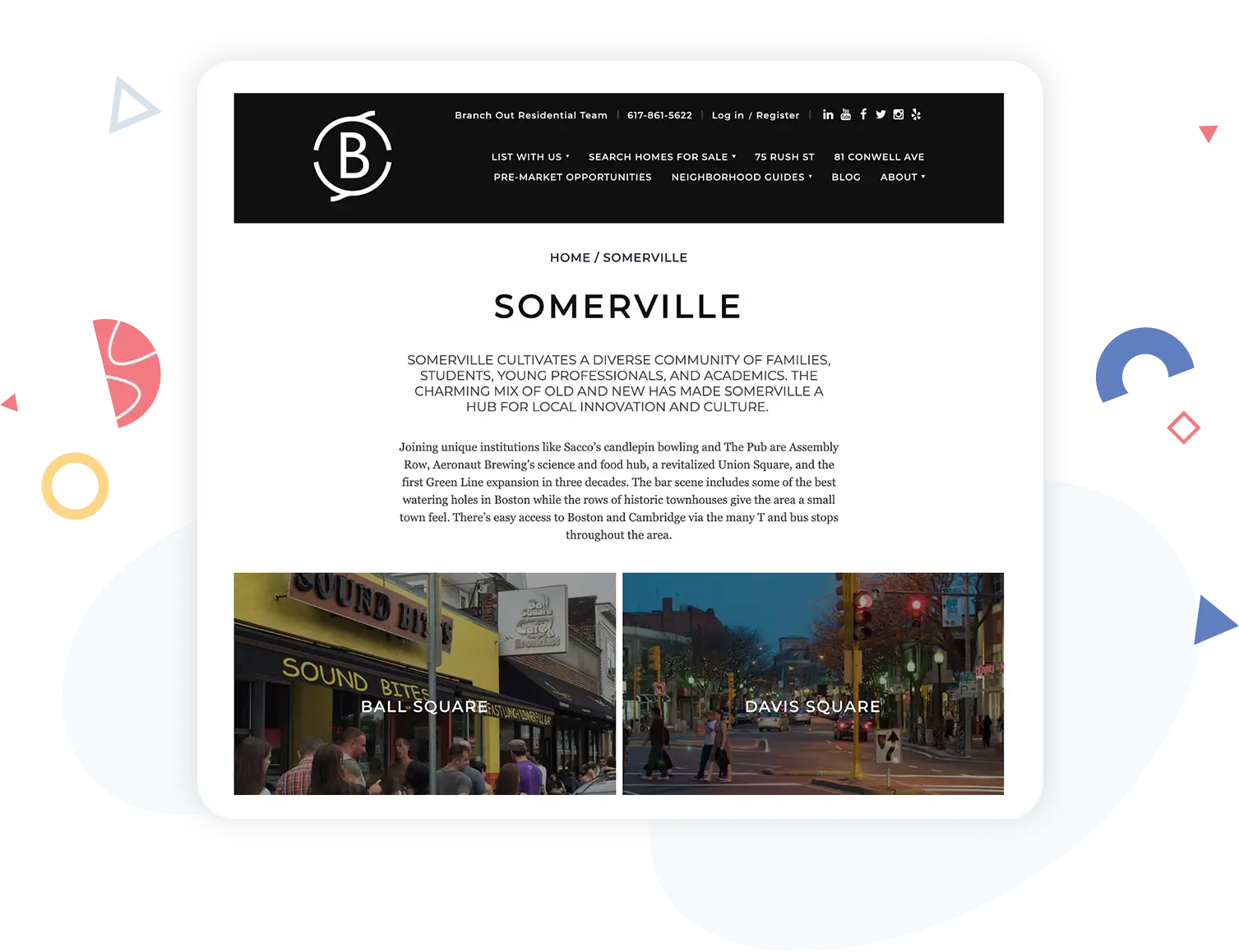
What can you put on a community page? Some popular topics include:
- Climate and landscape
- Demographics
- Economy and industry
- Local businesses
- Schools and colleges
- Sports teams, arenas, and events
- Theater and arts amenities
- Recreational facilities
- Medical infrastructure and healthcare
- Transportation and commuting
- Shopping
- Restaurants and food
- Festivals
- History
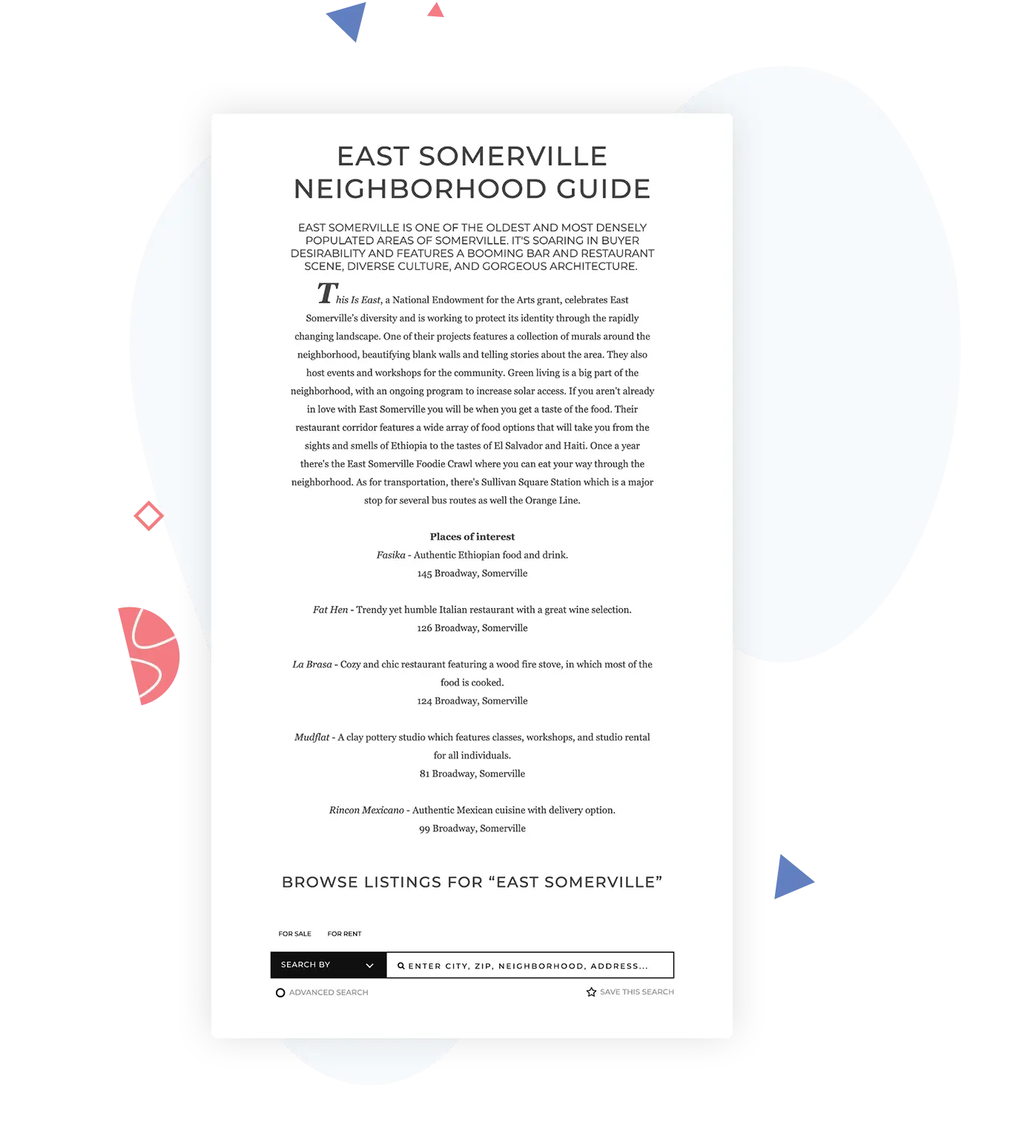
You can tell prospective buyers (and current homeowners) everything they could possibly want to know about living in your area without ever once mentioning real estate, although you could also create community pages about:
- Historic homes
- Types of homes
- Common inspection issues and problems
- Lifespan of different materials in the area (roofs, driveways, etc.)
- The housing market activity
If you do go with something more real estate-related, make sure you are loading up the landing page itself (and whatever offer you’re providing) with as much detailed information as possible. A landing page or community hub page about housing market activity that promises both buyers and sellers that it’s a great time to transact is not nearly as helpful or as enticing as a landing page that states days on market are up … and promises to explain what that means.
Don’t forget to optimize your community landing pages or hub pages for search engines so that you can also leverage the power of Google to share your knowledge with leads.
Reverse-engineer the competition
You no doubt know who your top competitors are in your market. Have you ever thought about looking closely at what they’re doing and imitating it? If you’re brand-new at real estate, this can be one way to eliminate some of the guesswork involved in lead generation in your market; if this other agent has figured it out (and it’s working for them), then it should work for you.
Tools like SimilarWeb will show you where a specific website is generating most of its online traffic. Here’s what SimilarWeb showed about Placester in March 2020:
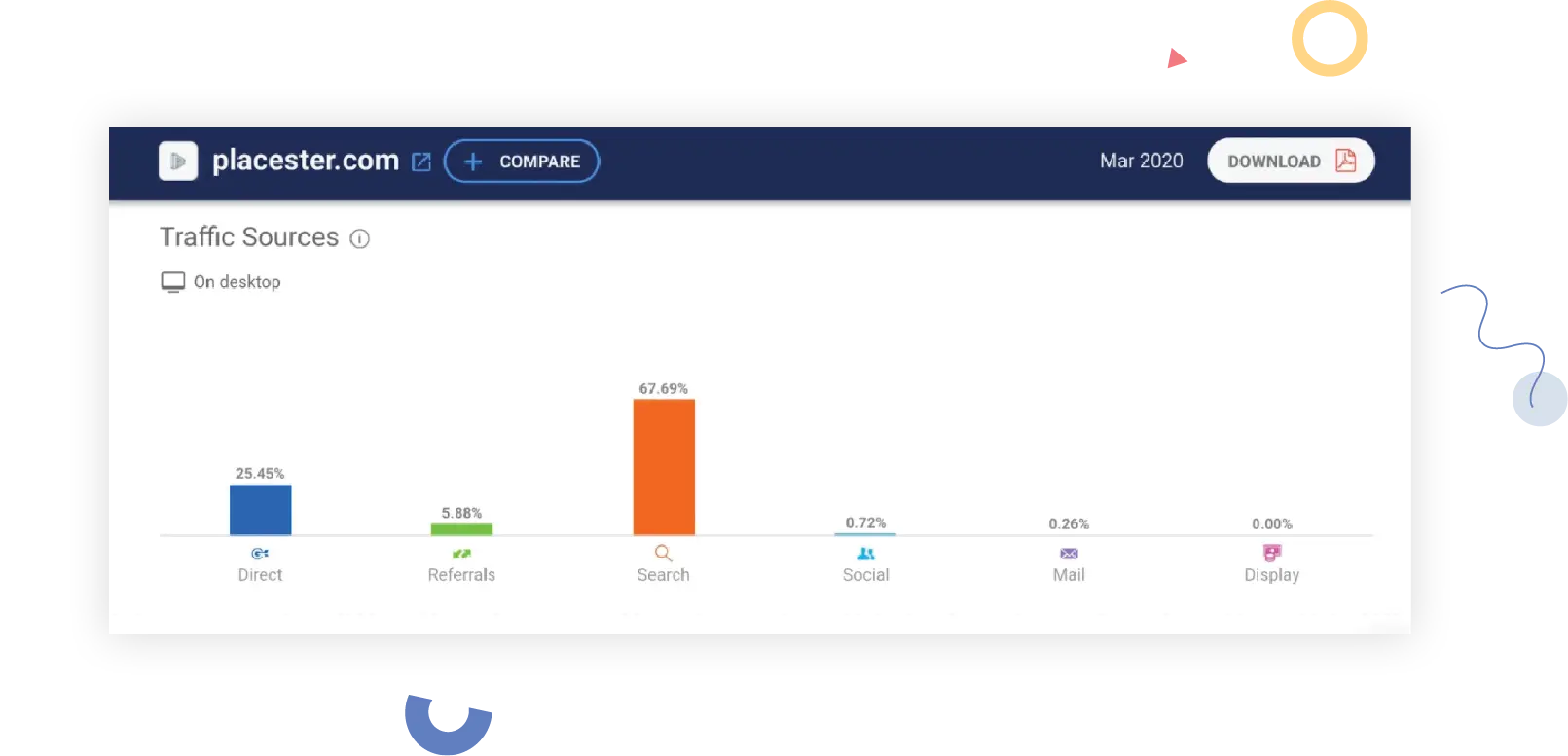
You can see that most of the traffic coming to Placester is coming from search engines like Google, followed by direct traffic. This definitely indicates that SEO could be a big potential source for new leads.
You can also see that Placester gets a decent amount of direct traffic and referrals. If you want to look further at referrals, you can see which sources are sending the most traffic to the website.
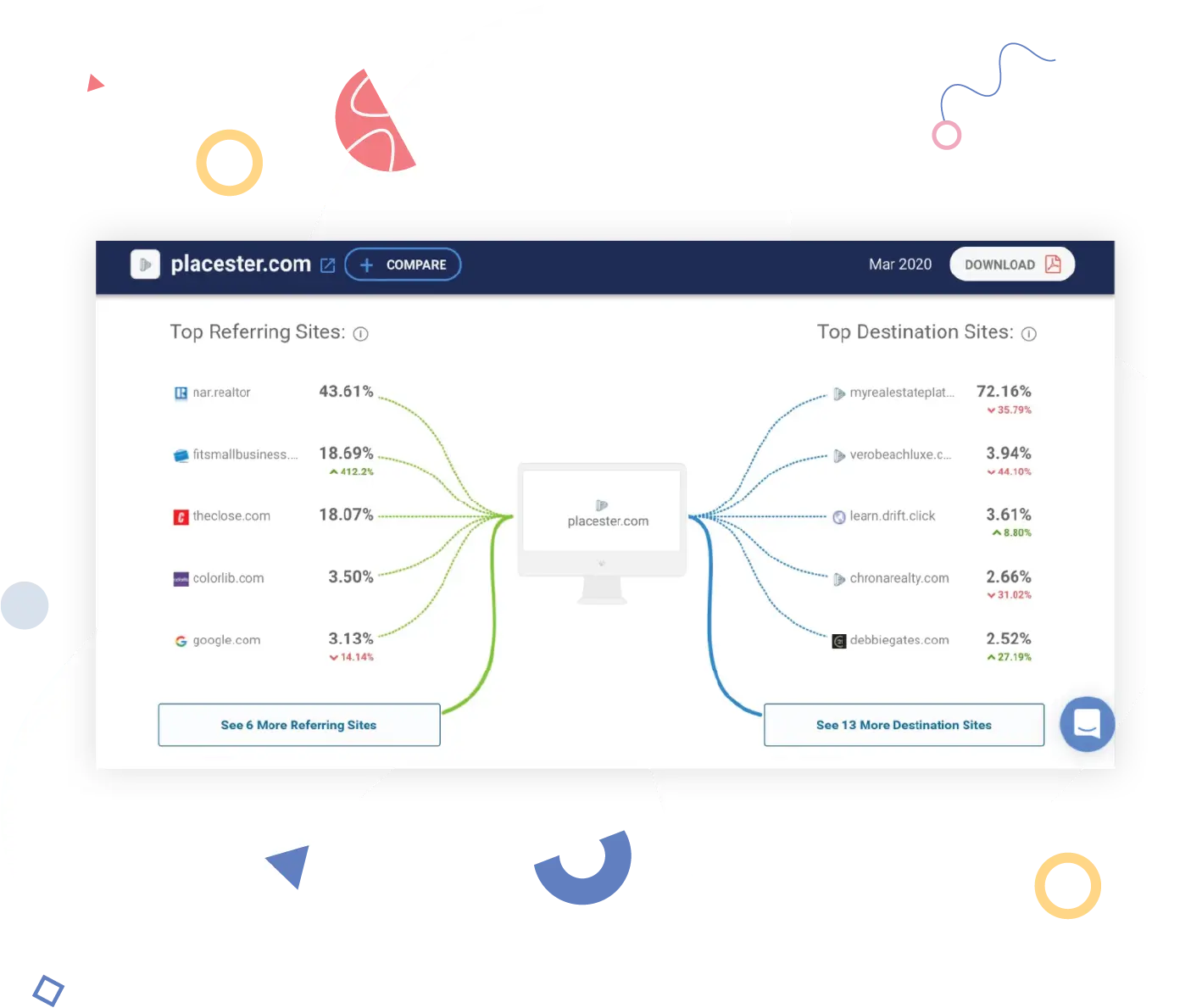
If you were Placester’s competition, you’d probably want to focus on Google, then possibly the referral and social media sites that are driving most of the traffic, because you already know they work well.
Another tool that can help you figure out what’s working well for the competition is BuiltWith. Enter the website into the search box and it will spit out the different tools that the website is, well, built with. If you know the platforms that are working well for the competition, you can avoid the stress of research and testing yourself and just go with what you know works well.
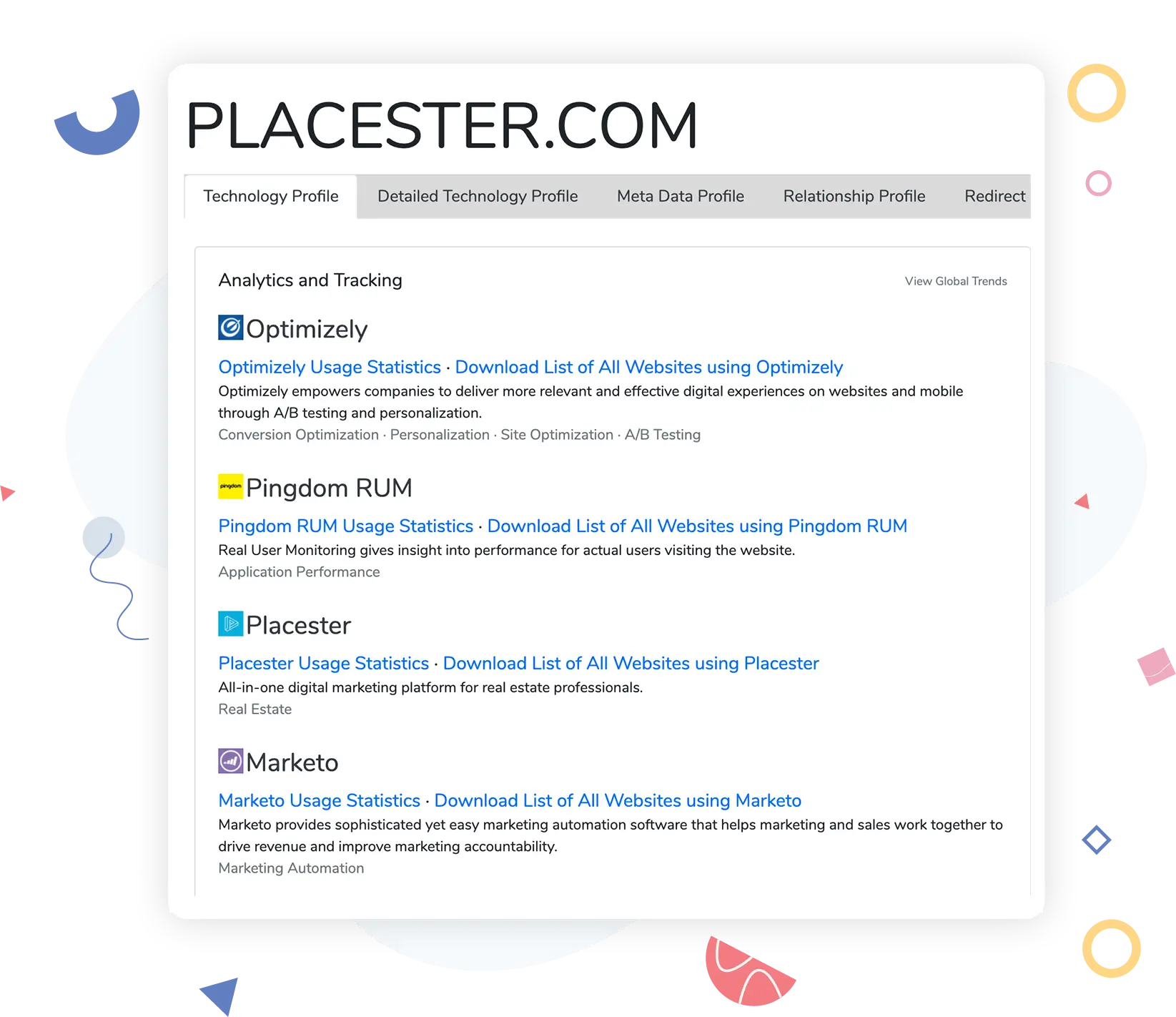
With lead generation, you can always piggyback on the success of others to find your own way. It’s the fastest way to get started with a proven roadmap, which you can always modify as you go to get where you want to be.
Virtual tours
Buying a house sight-unseen is becoming more common, but those buyers aren’t the only ones who are interested in virtual tours. Traditionally, real estate marketing includes photos and a written description of the home; lately, video has been added to the mix. A virtual tour is something different: It’s a way for buyers to walk through the house from the comfort of their own, which can save everyone time.
There are a few different companies offering virtual tour software and 360-degree imagery. When you’ve decided on your platform and recorded the tour, make sure it’s available everywhere, including on your website and on social media.
Video
Almost no medium lends itself to real estate marketing (and lead generation) like video does. You can show a house much more intimately in a video than you can in photographs, and you can also market yourself more effectively using video. Agents who rely on video as a main lead-generation strategy find that the clients who reach out to them feel like old friends because they’ve already gotten to know the agent.
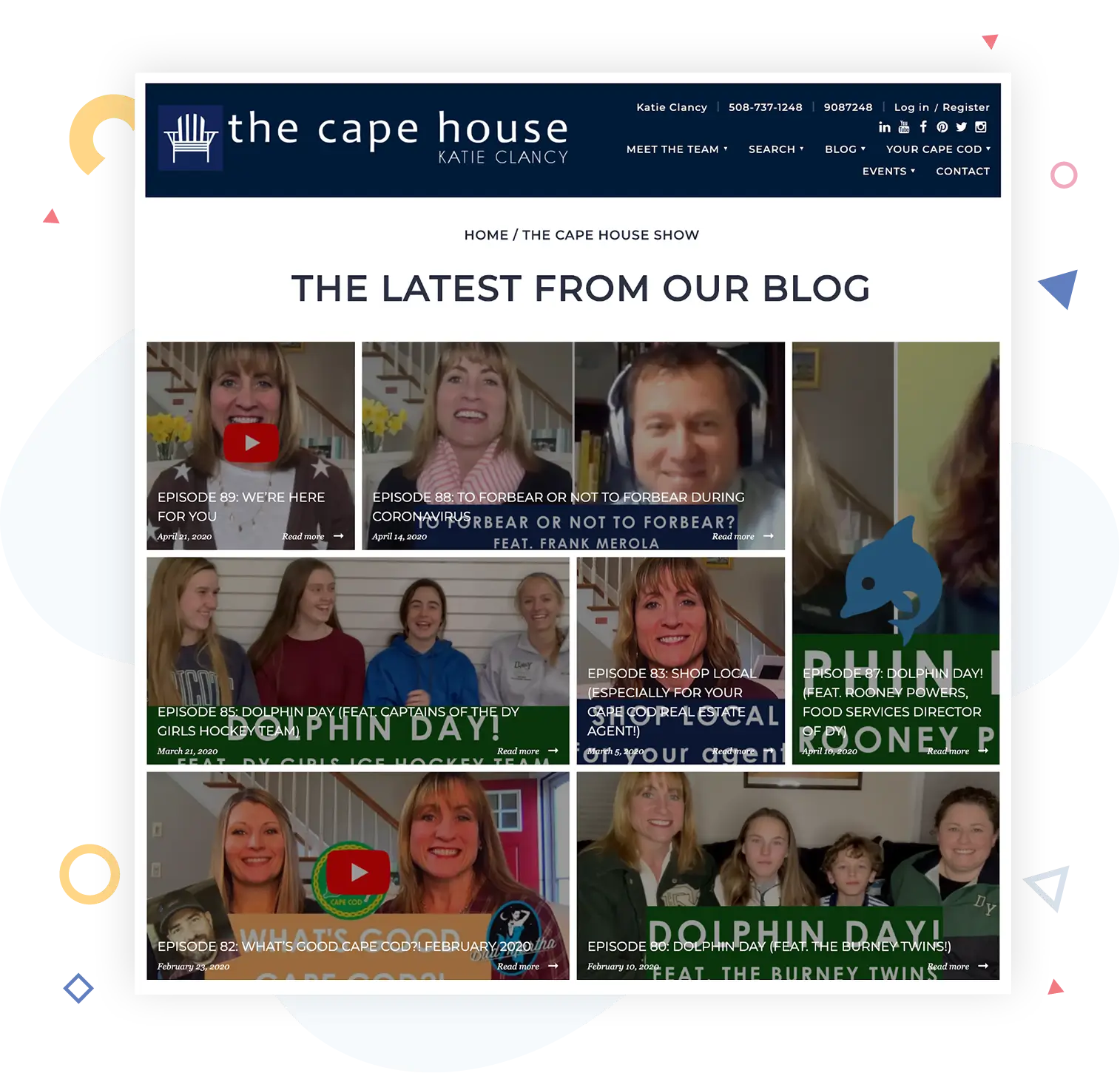
You can use videos for listings, obviously, but also neighborhood tours, recruiting, education, or testimonials — some agents profile other small businesses, others give history or shopping tours. The trick is to pick a topic or area of interest that’s deep enough that you can regularly produce videos … and then produce them regularly. Get more ideas in our guide.
Keyword targeting
A keyword is a word or phrase that someone types into a search engine in order to find whatever they’re seeking. Using relevant keywords in your ads and on your website increases your chance of showing up during those keyword searches — and also helps you figure out what buyers and sellers in your area are searching — but you need to know which keywords are relevant and important first.
You can do this using a company that generates keywords or ranks keywords for you, or you can simply use Google itself to figure out what’s ranking in your area. This search for “denver homes for sale” shows three neighborhoods, two price ranges, and one attribute that buyers are searching for in the Denver area. Agents who work in Cherry Creek, Washington Park, or Highland could do further keyword research to figure out what buyers in those areas want most.
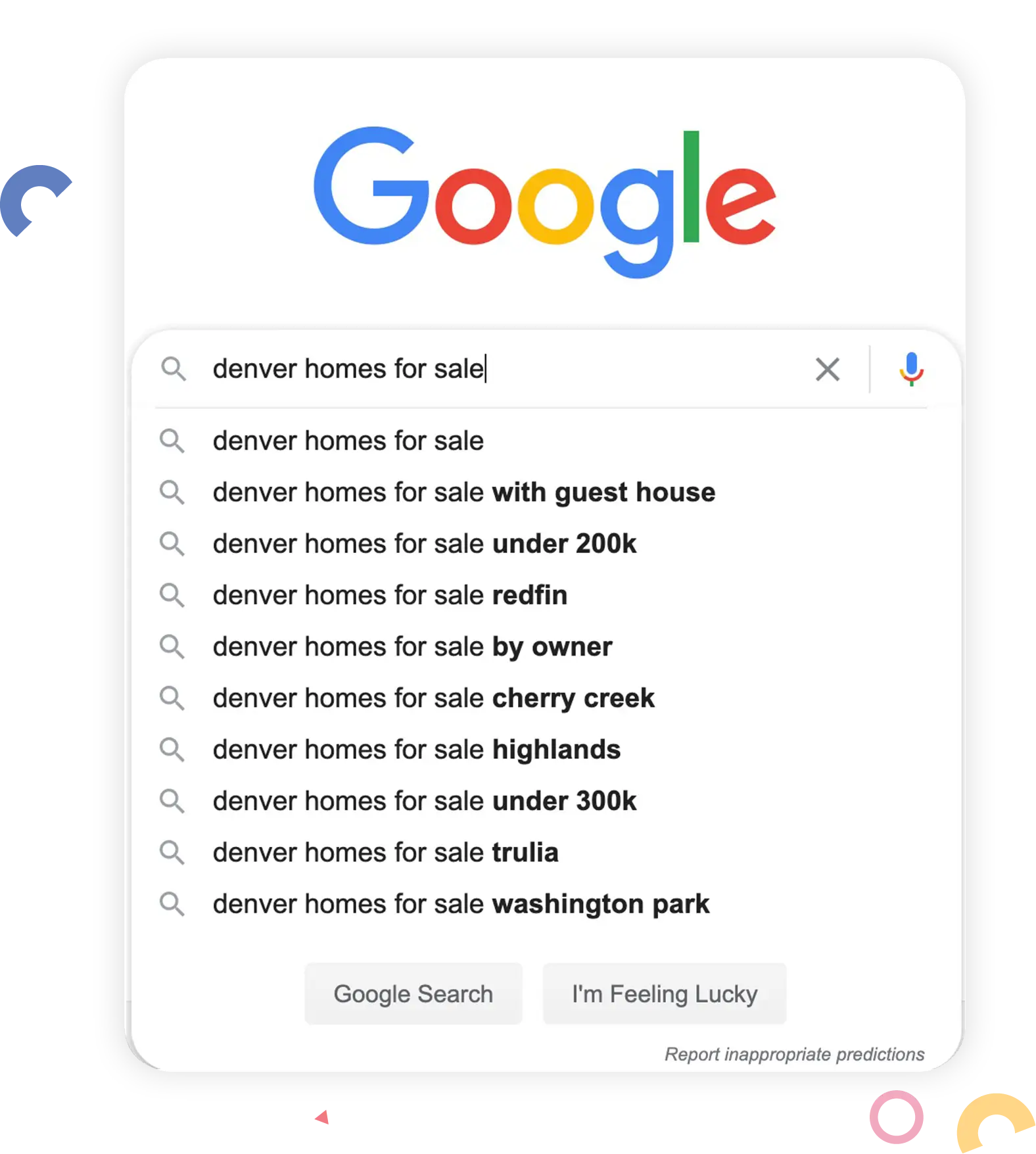
Keyword research also helps you identify and choose words for your ads and website that resonate most with the users searching for information. You can also plug in keywords to search for specific types of homes (condos, for example), or to see what specific types of buyers and sellers need (military relocation in “your city”, for example).
As you can see from the search results above, company names also make their way into keyword terms and can be useful in terms of understanding what buyers and sellers are searching and how you can compete. Make sure you’re targeting your own company brand name and location so competitors don’t show up above you in search rankings.
Bidding on competitor keywords
There’s no rule that says you can’t bid on keywords that include your competitors’ brand names; as long as the ads you run don’t include their brand name or trademark, you are free to target competitor keywords. There three key reasons you might want to do this:
- The keywords are relatively cheap compared to more common keywords in Google (such as “real estate”).
- The traffic from these keywords will be high-quality because the users are searching for the same services you provide.
- You’ll be exposing your brand to people who already know about your competitors.
Blogging
When you’ve done keyword research to figure out what buyers and sellers are searching for on Google in your area, you might as well take the next step and start blogging to generate leads for your business. That said, you can’t just post a blog here and there and expect leads to start pouring in. Like video, blogging requires consistent, tenacious effort before you start seeing results.
The best way to start populating your blog is to provide the information that people want. For example, the Windermere real estate blog offers advice and tips for different people interested in buying or selling a home in the greater Seattle area, including:
- Buying: The Risks and Rewards of Purchasing a Bank-Owned Home
- Selling: 5 Home Improvements That Will Boost Your Property Value
- Market news: 2019 Economic and Housing Forecast
- Community: Helping Students Realize Their Dreams Through Scholarship Programs
- Architecture: Avoiding the Pitfalls of Home Addition Construction
- Current events: Saving to Buy a Home During COVID-19
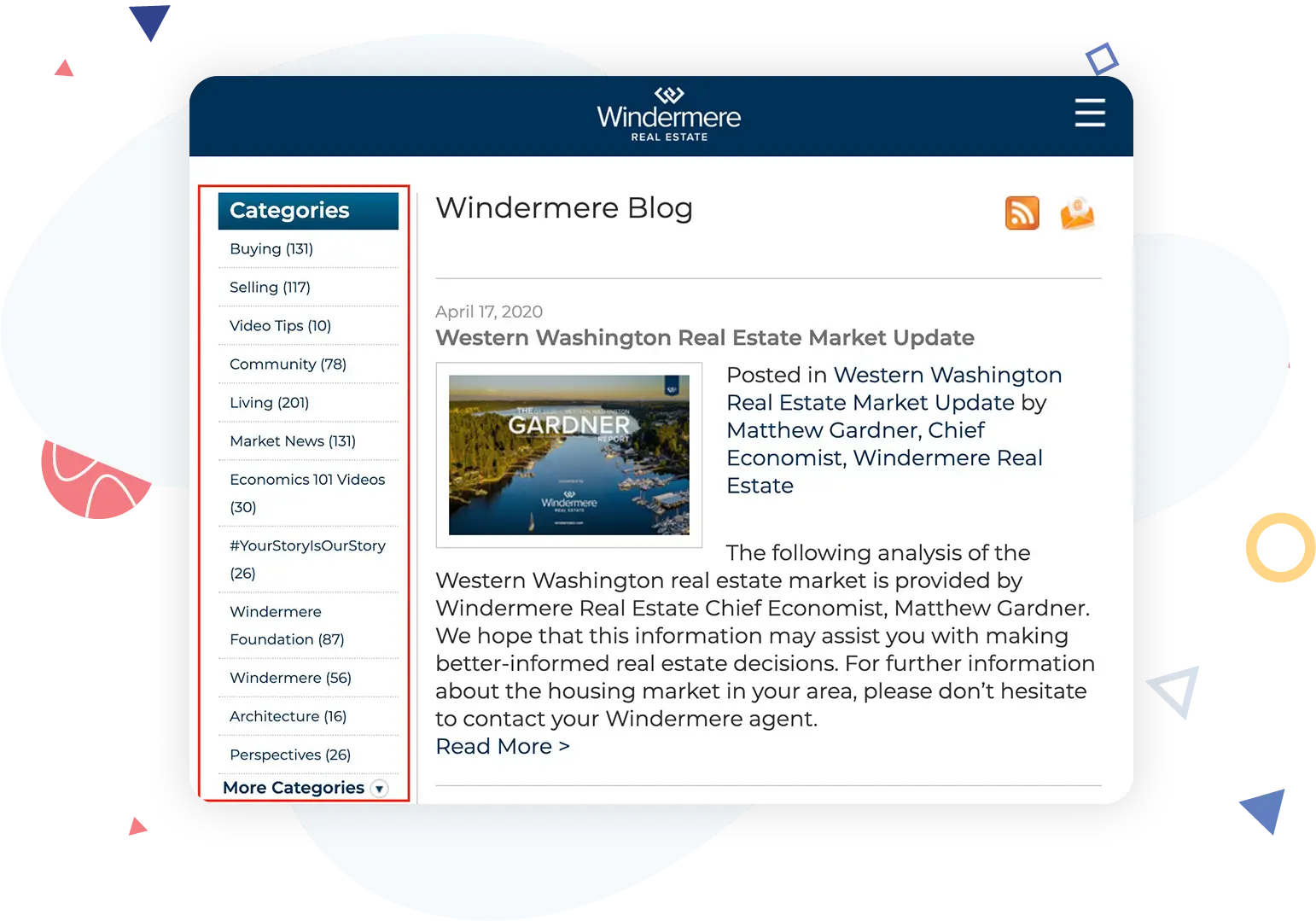
Facebook page
To advertise on Facebook, you’ll want to create a Facebook Business page — but never forget that advertising should not be the sole purpose of this page. You can reach your followers for free with status updates, pictures, stories, videos, links, any form you like. If you can keep things engaging and connect well with your audience, you’ll generate more interest in your services, traffic to your website, and qualified leads than if you ignore it.
Just like a blog or YouTube channel, to get the best results from your Facebook Business page, you’ll need to post regularly and keep it varied and interesting. Make sure your page has all of the following elements:
- Professional cover photo
- Professional headshot
- Your business name
- Your website and contact information
It’s also helpful to include if you can:
- Testimonials
- Business address and hours of operation
And you’ll want to post regularly to keep the page looking vibrant and your business alive. Post new and sold listings, stories about your day, pictures of your pet, real estate-related news, business and development information, and anything else that you think will engage your followers.
Live chat
Offering a live chat function on your website is a lovely thing to do for buyers and sellers who have questions but who aren’t ready to pick up the phone and have a conversation with an agent just yet. There are a number of apps and bots available that you can use to answer those questions, including the Facebook Messenger app.
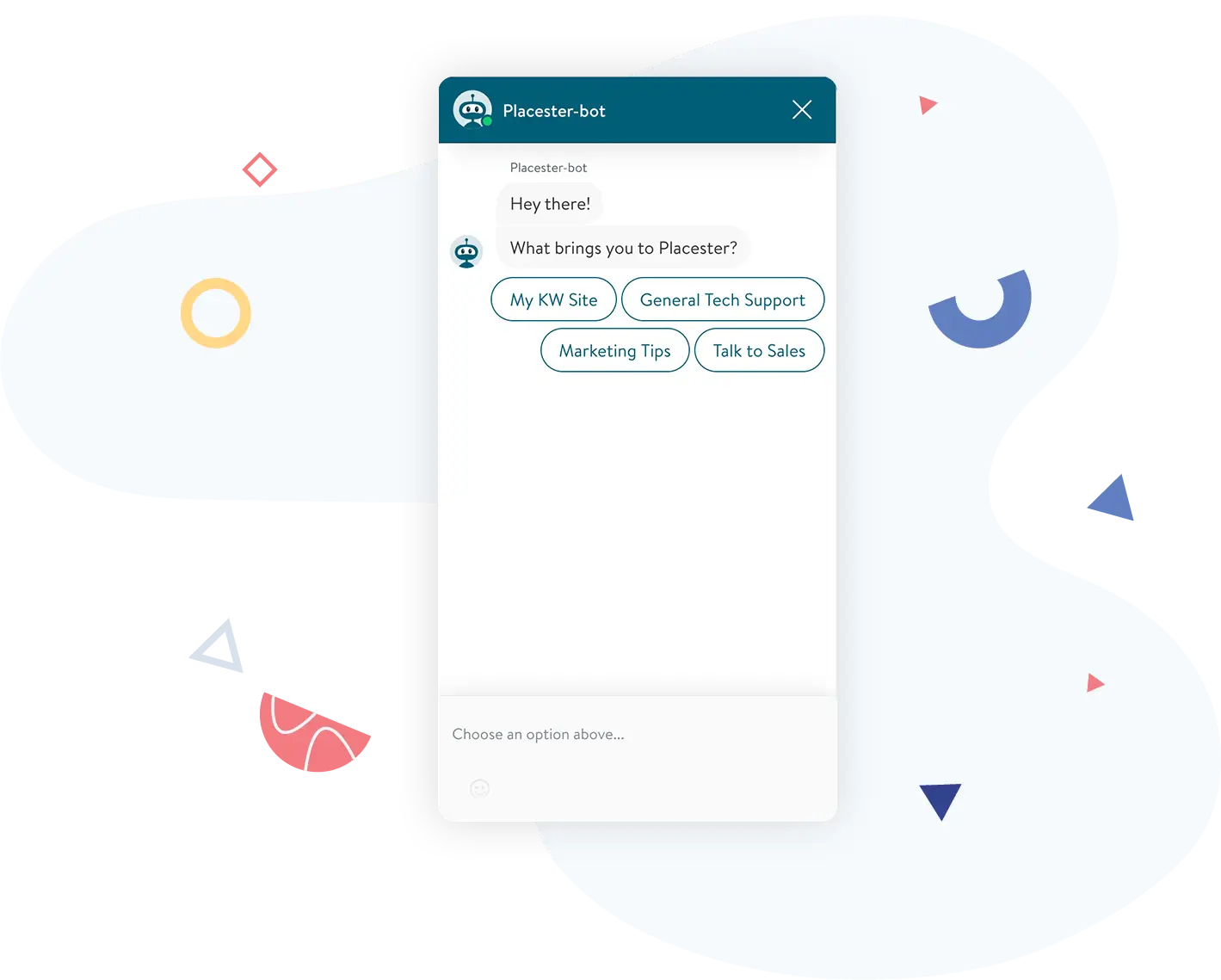
Typically, you can preset a number of answers to common questions that you hear from buyers and sellers, and then decide at which point to offer a human response. But the live chat app can pull listing information from the MLS, direct buyers and sellers to relevant areas of your website, and more.
Offer advice on social media
When possible homebuyers and sellers have questions, one place they turn to get answers is social media. You can be a resource for them (and generate leads in the meantime by showcasing your expertise) by keeping tabs on those areas and responding to their questions.
Local Facebook Groups are one good place to find people asking real estate-related questions, and so is Nextdoor. Two other national sources to provide real estate advice are Reddit and Quora, where the questions (and answers) are more evergreen (they stick around longer) than on Facebook or Nextdoor.
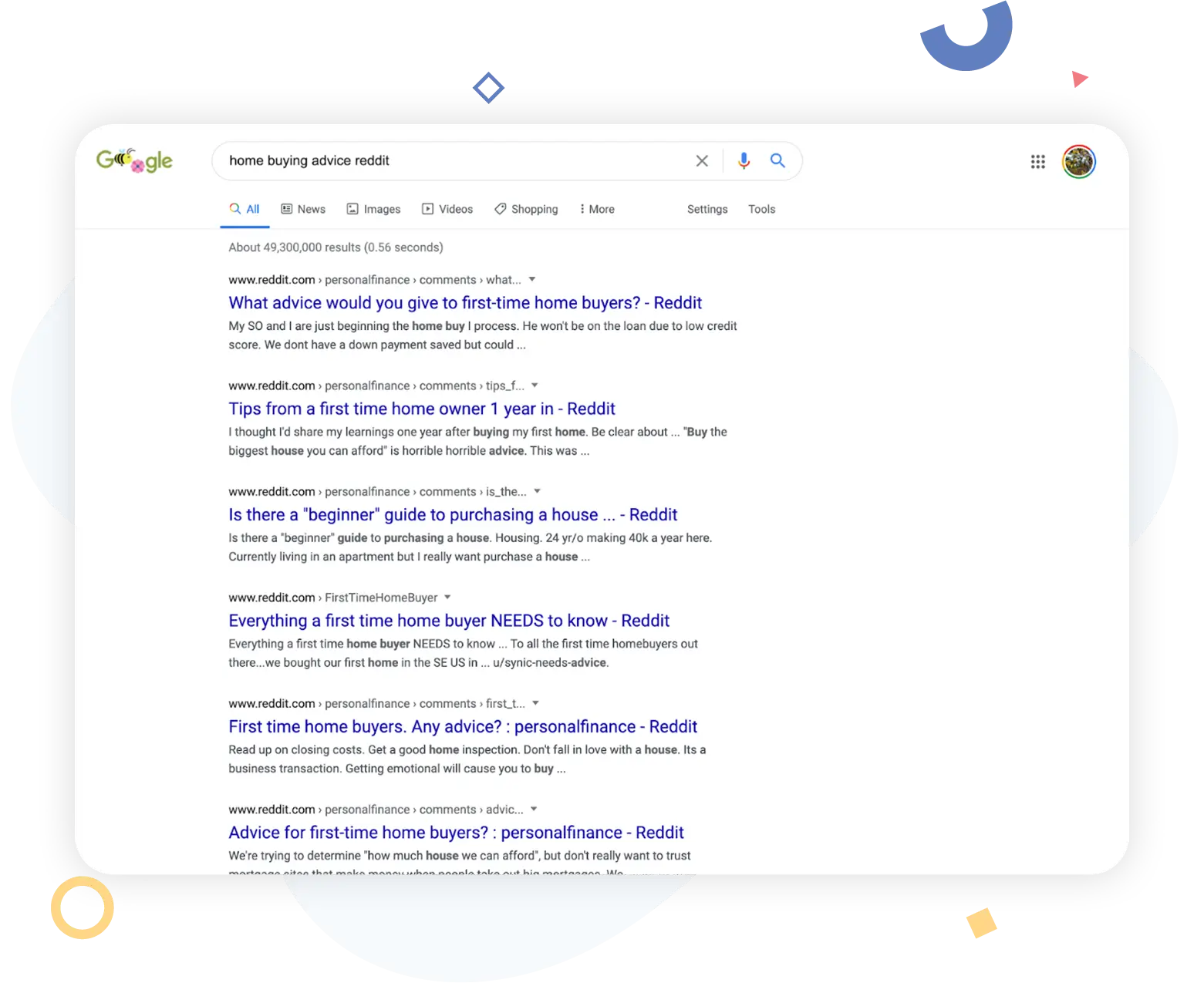
When you offer advice, remember that the advice is most important and selling your services is the last consideration. You want people to think of you as helpful, not a salesperson trolling for leads anywhere you can find them.
Offer financial tools
The financial education most of us got in school was, well, lacking. Many buyers are surprised when they sit down and start crunching the numbers because they realize they might have been able to buy sooner with a little bit of information and financial education.
Many real estate professionals offer tools like home valuation calculators, but home affordability calculators and down payment calculators can be two other financial tools that you can provide for buyers in particular. A trade-in calculator for sellers might help them figure out how much they could afford if they were to sell their current house. And if the users like the tools, they’ll reach out to the person providing them (that’s you) to learn more about making their dream a reality.
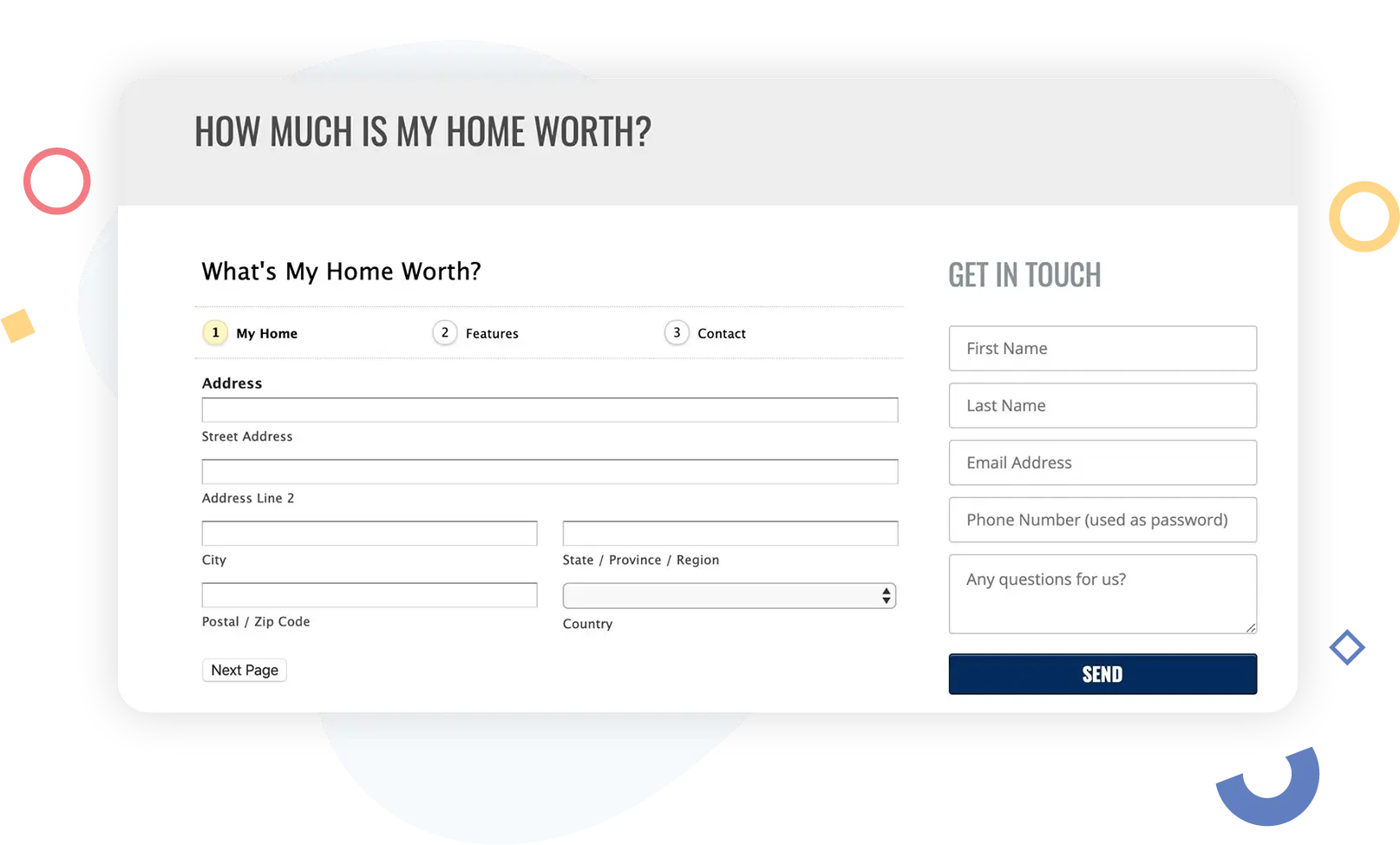
Third-party apps like Homebot give agents the ability to provide granular financial details to homeowners, such as how much they could save if they were to refinance under current market mortgage rates, or how much they could afford to spend on a trade-up if they sold their current house and used the money for a down payment.
Get creative with listings
People love fun, weird marketing stories, and one easy way you can generate some interest in what you do and your business is by telling one. Agents have to market listings every day, and some of the methods they’ve used to sell homes are truly delightful.
Whether you’re dressing up in a T-Rex costume and posing in all of your listing’s photos or creating a listing landing page with stories about the family that’s leaving the home and the memories they created in it, going above and beyond with your listings can generate interest from buyers and other sellers who want a creative professional on their side.
Text messaging
Text messaging is one of the most reliable forms of communication in the modern era, and more and more of your clients are likely to be more and more comfortable with texting. It’s not just a way to communicate with more tech-savvy buyers and sellers, though; you can also automate text messages to send potential buyers details about other properties.
Facebook Messenger
Like text messaging, the beauty of Facebook Messenger is that it’s both instant and can be consumed when the recipient chooses. You can send links, images, emoji, and other assets, and Facebook also offers a Messenger bot that will allow you to send responses to specific requests without having to pay personal attention.
Create an email course
An email course is simply a campaign of emails sent in a specific order and including different lessons or instructions; put together, the recipient gets a level of coaching or education that’s more in-depth than they’d be able to absorb from a website, but not as deep as an in-person course taught by an instructor.
Real estate agents can offer email courses on:
- How to save up for a house
- How to make a home maintenance plan and budget
- How to shop for a mortgage
- How to shop for a house
- How to declutter a house
- How to stage a house
- How to take placeholder listing photos or videos
- How to spring-clean
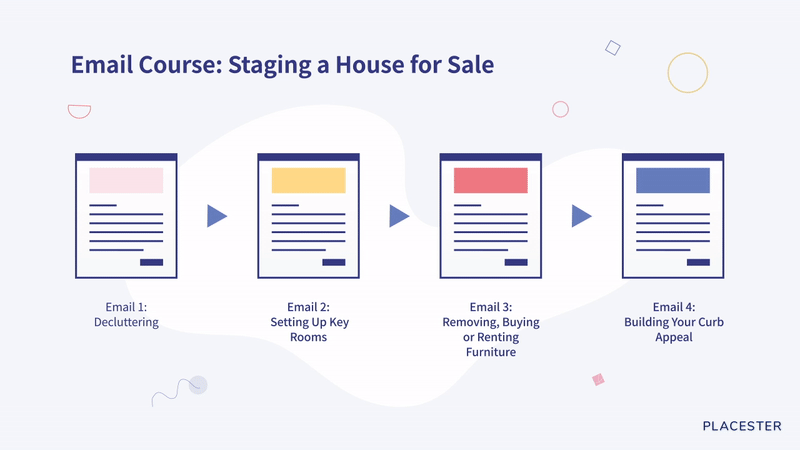
Users will get the offer for the email course via a landing page and provide their email address in order to receive it. You can set up the course using a service like Constant Contact, which will automatically deliver one lesson every day until the course is finished.
Email segmentation
When you have a lead’s email address, it makes sense to keep in touch via email … but how do you know what to send to whom? Email segmentation is how you make sense of your email lead generation strategy; you should already be tracking the people who get your emails in your lead management software or CRM, but you need to then categorize them according to whether they are a buyer or a seller (or a homeowner), their demographics (age, relationship status, level of education, career), where they live (as precisely as you can), and where they are in the customer journey.
This way, you can save the emails about new listings for buyers (and maybe for sellers who live nearby), the emails about downsizing for empty-nesters close to retirement age, and the emails about saving up for a down payment to buyers at the very beginning of the process. You can also avoid blasting people who aren’t interested in your services right now with email, which will make them less likely to unsubscribe from your lists and more likely to open any (relevant) email you send them in the future.

Avoid wasting time on the leads that won’t funnel through: Qualifying your leads
Generating leads is the first step to finding a new customer, but after you generate the leads, you have to figure out where your time will most effectively be spent moving forward. To do this, you have to qualify your leads — sort them into scoring categories so you know who’s ready to make a decision soon and who’s probably going to wait a few weeks or months before they choose an agent.
Most of the time, leads are qualified as “hot,” “warm,” and “cold.” If you think of these qualifications as corresponding to the awareness/evaluation/conversion funnel, then cold leads are in the awareness stage, warm leads are in the evaluation stage, and hot leads are ready to convert.
A good CRM (such as Placester’s Basic CRM) will give you the ability to score your leads so that you know who is ready to hire you today, who will be ready next week, and who will be ready next month.
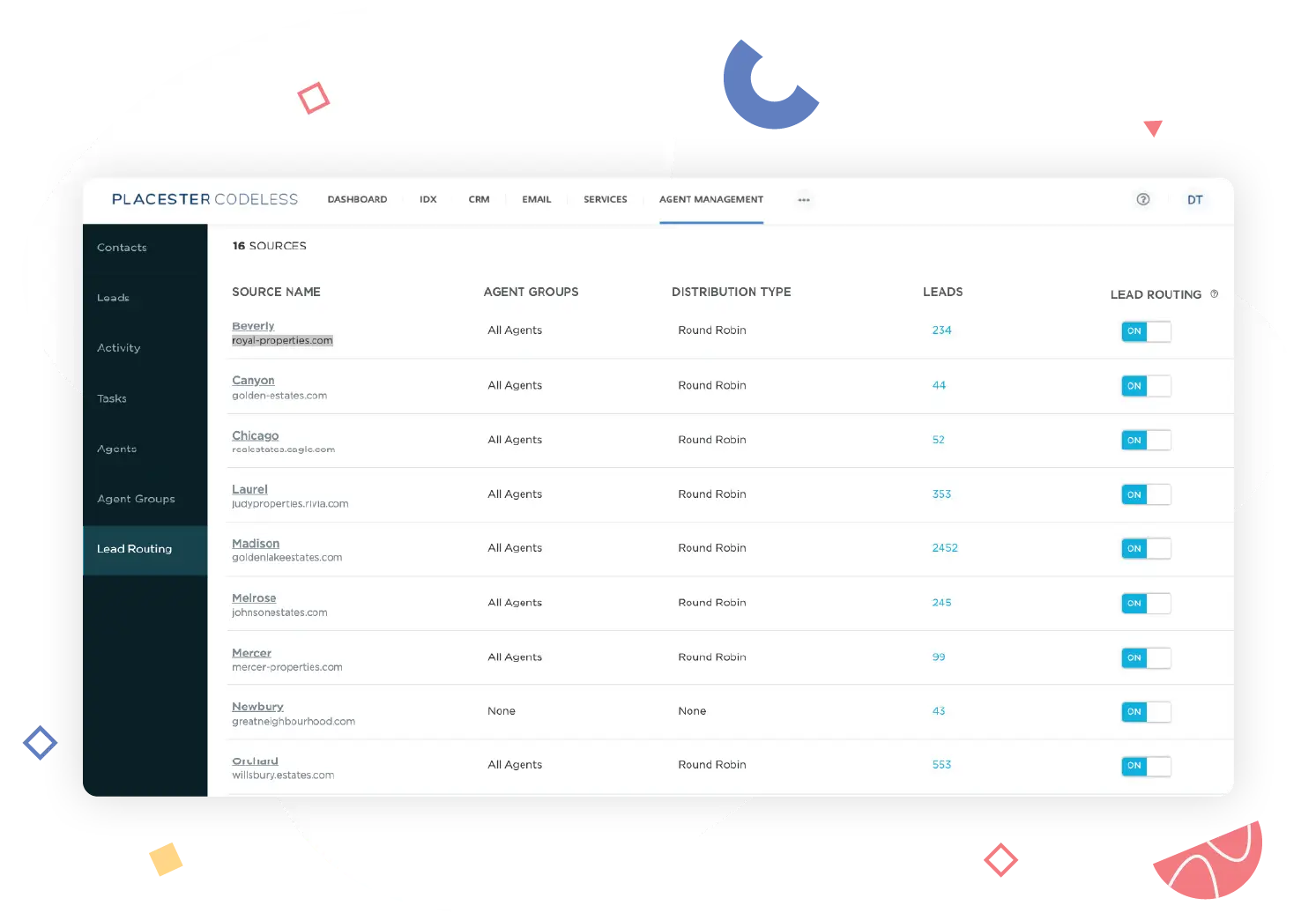
Your lead scoring should depend on your niche, your target buyer or seller, and their own timeline to buy or sell. Remember that you also want to target potential buyers or sellers who haven’t entered or have already left their customer journeys; they can refer your services to friends or might use you as their agent the next time they want to buy or sell a house.
Leads who aren’t currently active or who are in the awareness phase of the customer journey will need to be “nurtured” in order to convert them from cold leads into warm leads or hot leads. This means you’ll keep in touch with them periodically and offer them assistance and resources, but you know they aren’t thinking about making a decision right now, so you’re focusing your attention elsewhere.
Leads who are active — in the evaluation or conversion stages of the funnel — will want to be courted more intently than inactive leads. And a lead at the conversion stage is as hot a lead as you’re going to find, so that’s where you should put most of your energy and efforts when you’re working on your lead generation.
Your criteria for qualifying leads won’t be the same as anyone else’s; maybe you’ll discover some demographic attributes that are unique to the buyers and sellers who flock to you. Be willing and able to tweak how you score and qualify leads so that you can ensure you’re spending your time wisely.
Nurturing your leads to coax them down, down, down your sales funnel
Some leads require more nurturing than others, but the philosophy behind nurturing a lead is much like nurturing a plant, animal, or child: You give them what they need to help them grow well. In the lead’s case, you are helping them grow from someone who thinks they might want to buy or sell a house someday into someone who’s ready to sign a contract this minute.
This growth pattern isn’t going to work for every lead because not every lead is going to want to grow in this direction. So if a lead unsubscribes or drops out during your nurturing efforts, don’t view it as a loss. Instead, think of it as another benefit of lead nurturing because you aren’t wasting time with leads who don’t truly want to buy or sell anything.
Your lead nurturing can and should be very different for buyers, sellers, renters, and homeowners. Think about the big problems and pain points that these different groups of clients experience, and build your lead nurturing around them. What do buyers need to know before they start shopping for homes online? What do sellers need to know before they open their doors to the listing photographer? What do renters need to know before they get ready to renew their lease? What do homeowners need to know at this particular time of year, or about this particular local item of interest?
This is another area where keyword research can help you determine what your clients want and how to deliver it to them. They’re turning to Google and other search engines for the answer, but if you can provide it for them directly, they won’t need to go searching.
Nurturing leads can also include some of the traditional outbound lead-generation tactics we described, such as handwritten notes or phone calls. Using a CRM to keep track of the leads you’ve nurtured most recently and the ones that could most use your attention becomes critical once you start doing plenty of business and can’t remember which leads you last contacted.
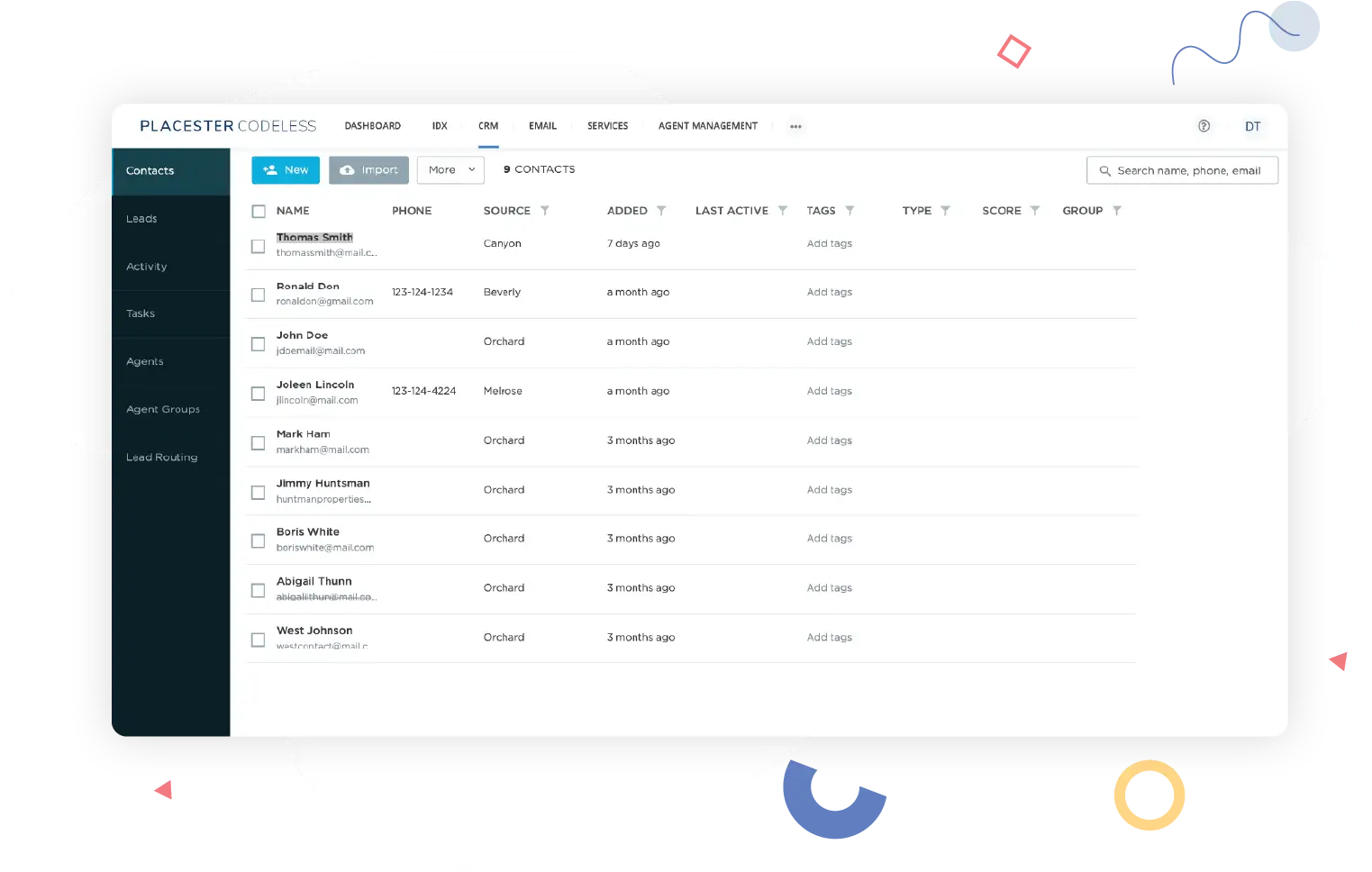
I’ve mastered lead generation! Now what?! Iterating and improving
Your lead-generation strategy isn’t going to be perfect in your first months or probably your first couple of years as a real estate agent. It can and should be a work in progress because there are new methods for generating leads emerging constantly, and you’ll want to try what sounds interesting and discard what’s not working.
To iterate and improve effectively, you’ll need the right tools. A website with tracking and analytics functionality and a CRM that you can use to keep tabs on your leads will be necessities on your lead-generation journey. You won’t be able to keep up with your campaigns, website visitors, their place in the funnel, and your nurturing efforts using a spreadsheet for very long at all. And you can’t iterate and improve without data and feedback so you can assess what’s working well and what could use some tweaking.
A core lead-generation strategy should include three or four main tactics that synchronize to support each other, but once you figure those out, there’s no reason why you can’t add as many as you can handle (or hire help to handle for you). Find your core strategy first, then start adding new lead-generation tools and techniques from this guide and from other sources to see what works best for you.
As you add more and your business expands, you might find that some tactics that worked very well for you initially are no longer as viable, and you might decide to invest those resources elsewhere. Your core strategy might change key tactics more than once, and that’s okay; it means you’re growing as an entrepreneur.
Be consistent
You can’t use all of these lead-generation methods all of the time, and you shouldn’t try! Choose the tactics that resonate the most with the brand you’re trying to present to the world and your own personality and working style.
Above all, you must be consistent. It’s not enough to decide you’re going to use a tactic and then halfheartedly explore it. Select the methods you think will be most lucrative, then implement and refine them until they run like a well-oiled machine.
With the right tools, the right attitude, and a solid plan, generating real estate leads doesn’t have to be (and isn’t) rocket science. It’s about deciding on a course and committing to see where it takes you. Lay the groundwork with a high-performing real estate website and key basics like a CRM, and you’ll have a lead-generation strategy that propels your business to the next level before you know it.





